#and didn't get the natural development that all the other characters that were continuously published got
Text
From Doc Shaner’s podcast interview with The Comics Cube:
Duy Tano: We've been talking about characters like the Golden Age Captain Marvel, Space Ghost, so we're going really old here, Flash [Gordon] is even older than the Golden Age Captain Marvel- what is the appeal of the retro stuff to you?
Doc Shaner: It's hard to say. Obviously I'm not old enough to have known those characters when they were most popular, or when they first came about, so it's not like I have legit nostalgia for them, per se. But, I think, certainly, it's got to be at least partially an aesthetic that I'm fond of, a lot of the art deco stylings and the simple bold choices made by Beck and Alex Raymond and a lot of those creators is certainly very appealing to me. I like the simplicity of the characters. And they're so big and broad that I think there's a lot of fun to be had and kind of boring down and getting specific with those characters.
Duy Tano: What do you feel about the fact that the Golden Age Captain Marvel was the biggest superhero of the 1940s? And Flash Gordon might have been the biggest "superhero," though the word didn't exist back then, before Superman? And what do you think about the fact that those are like kind of just lost to history, you know, people don't know that? They see a Shazam movie coming out and they're like 'oh, who's Shazam?'
Doc Shaner: It's tough because I think Flash Gordon, certainly, even with a movie in the 80s, that was set in the 80s, it's unambiguously supposed to be of its time, and then the cartoon and what have you, so much of Flash Gordon is caught in his original time period, just the whole notion of him being just a guy who's really capable, that's a very old-school notion. Even with like modern action stars and movies and TV and stuff, there's still something about Flash that feels of it's time. And I think, unfortunately, a lot of that's still stuck on Captain Marvel, too. My theory has always been that Cap got essentially taken off the stands during the Silver Age of Comics, he wasn't able to grow in a lot of the ways Superman did, and Batman and a lot of those characters did. A lot of those DC characters grew and thrived in the Silver Age. And he missed, you know, the advent of Marvel Comics, too. So when DC tried to bring Cap and the family back, he was still very much a 40s character. And I don't want to deny the charm of that because there certainly is. It's what drew me to him in the first place, was that charm. But I think it also stagnated him in a big way, that I think that time period let the greater audience, the greater reader, think of Superman and Batman as being a little more malleable than Captain Marvel. And because of that, creators and readers alike, I think we struggle to let Cap grow naturally, because we want him to be the way he was, cause that's what we like about him. I think after I did Convergence: Shazam! with Jeff, that was why I, for a long time, I think I'd kind of closed the book for me and Shazam. Because I'd gotten my feelings of retro Golden Age nostalgia out of my system with those two issues. Jeff and I knew that it was not an opportunity that was going to come along very often, so we did everything we could to pack as much of our Captain Marvel fanboyism into those two issues. So we put as many villains as we could in there, and the whole family, and Tawky, and even Mr. Morris, and Uncle Dudley. We did everything we could because we knew we weren't going to get another chance like that to work with that version of the character. But yeah, I think for a long time it made me kind of think 'no, I think I'm done with Shazam' because I don't know what we can do with that character and that world, first what DC'll let us do, and what the readers will let us do, because I think a lot of times those are at odds.
#absolutely LOVE the way Doc puts it here#he's soo right#like because the Marvel Family wasn't published during the Silver Age at all#and didn't get the natural development that all the other characters that were continuously published got#and has instead since gotten either comics that are about that preserved 40s version#or hard reboot after hard reboot#Captain Marvel fans are particularly resistant to change more than other fans of other characters to an (in my opinion) absurd degree#I'm saying this as someone that is opposed to the New 52 reboot because of its basis in rejecting core aspects of the prior character#it's so interesting to hear a creator's perspective on this#that it feels like audiences don't consider the character malleable and won't let them do new things with him#I feel like I'm in the minority of fans that doesn't necessarily want the original version brought back#even though the Pre-Crisis version is my favorite version#like I don't think that that's the obviously best course for him in the way that it seems many fans do#I would love more comics from creators who love the characters and are interested in EXPERIMENTING with them#it doesn't have to conform to my view of the pre-existing character it just has to be INTERESTING STORYTELLING#this reminds me of the Ram V quote I posted earlier about how as a creator you can't approach as a fan#because a fan inherently believes that the best version of the character has already been published#dc#marvel family#billy batson#my posts#interviews
4 notes
·
View notes
Text
It’s Cold in that Fridge: The Case of Nakari Kelen
Since The Case of Mara Jade has been doing the rounds again, I’ve finally gone back to this post that has been sitting in my drafts for literally years. So let’s honour this absolute badass who deserved better:
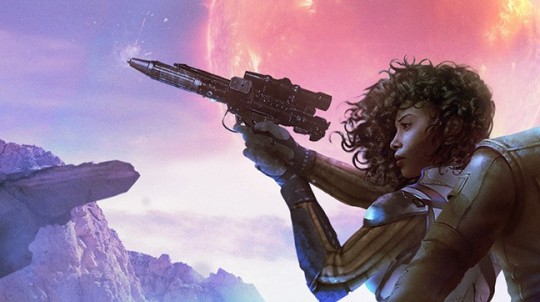
Once upon a time, the Star Wars universe was but six films (and a tv series) in the story of the Skywalker family. But beyond George Lucas’ story was an absolute boatload of books, comics, games, and other materials that made up the Expanded Universe. When Disney purchased Lucasfilm and the rights to the Star Wars saga, everything in this universe was decanonised and deemed “Legends” - some aspects of this universe were retained or re-purposed, others sit in Disney’s figurative vault and will likely never see the light of day (and seeing how the ST turned out, maybe that’s for the best).
But this transition between Legends canon and Disney canon was not so simple, because the nature of publishing meant that there were novels approved during the time of Legends canon that would be released in the time of Disney canon. In particular, there had been the planned trilogy “Empire and Rebellion”, set between A New Hope and The Empire Strikes Back, with each novel from the perspective of one of The Big Three.
Razor’s Edge (Leia) and Honor Among Thieves (Han) were released prior to the Great Canon Split of 2014. But while the Luke-centric novel had been planned, it was not due to be released until well after the Split. So Heir to the Jedi (so called as an homage to the Legends progenitor Heir to the Empire) became one of the first books of the Disney canon.
What does this background have to do with Nakari Kelen? Perhaps nothing, but I do wonder how the writing process was affected by the shift from Legends to Disney - was the novel a relic of the old EU with any reference the LFL storygroup didn’t like excised during editing, or was it a trendsetter for the new EU, a Sign of Things to Come?
The most salient point being, of course, that Nakari Kelen - like so many love interests before her - was not allowed to go along her merry way at the conclusion of the novel, but was shoved into the fridge.
If there was one constant of the Legends EU, it was that Luke Skywalker’s love interests couldn’t catch a break. Mara Jade naturally lasted the longest relationship-wise, with almost twenty years of marriage to Luke before some bright spark decided she had to go (as per the aforementioned case study). But before Mara there was Jem, Shira Brie, and Gaeriel Captison (who came close to escaping the curse), and in the Legacy of the Force series they brought back sole survivors Akanah and Callista, only to kill them off for good too (and rather brutally, if I may add).
So perhaps when Kevin Hearne began writing HttJ within the confines of the Legends continuity, he was merely sticking to the status quo, or perhaps once subsumed by Disney they needed to make sure Luke's slate was clean (so to speak). And I can’t put all the blame on Hearne since I don’t know whether it was his idea, or LFL mandated - but regardless it was a poor decision.
The root cause of fridging, imo, is limited imagination. How best to cause your male protagonist pain if not kill off someone they love, or at least have strong feelings for? The answer is of course, easily. But I’m getting ahead of myself.
The Luke Skywalker of HttJ is fresh from his victory in ANH, a lieutenant in the Rebellion: young, not dumb, and full of...
Nakari Kalen is an absolute Queen a civilian volunteer and crack-shot sniper who loans her ship Desert Jewel to the Alliance. Luke is immediately attracted to her, they bond over a mutual love of fast ships and leaving behind desert home planets, and engage in the inexpert flirting of two nineteen year olds while also risking their lives several times over.
I want to make it clear: I actually really like this book. It's a breezy read, almost serialised as The Early Adventures of Luke Skywalker, and is ofttimes genuinely funny. And credit where it’s due to Hearne, many of of the supporting roles in the novel are female. Other than Nakari, there's Soonta, the Rodian who gives Luke her uncle’s lightsaber, Sakhet the Kupohan spy, and the Givin cryptographer/math genius Drusil Bephorin. In a genre where male characters are often the default for these kind of roles, it was nice to see, but makes the regressive fridging of Nakari even more egregious.
Luke and Nakari make a good team fighting brain-sucking monsters and Imperials, but more importantly they have fun together - she encourages him to work on his Force skills, and he successfully moves objects with his mind for the first time (leading to Nakari adorably dub him "a little noddle scooter"). It's a very sweet, if brief, relationship, and a respite from the danger of the mission. They spend the night together (leaving the reader to decide exactly what happened behind closed doors), and share a kiss before splitting up to try and escape bounty hunters. No prizes for guessing what happens to Nakari immediately after she received the Skywalker Kiss of Death.
I assume there were two motivating factors for why Hearne and/or LFL couldn't let Nakari live:
1. If she survived, fans would wonder why she doesn't appear in ESB/subsequent material.
I recall this bandied about on forums back at the time of the book's release, and to that I say - so what? Fans are always going to wonder, and try to paper over the gaps in canon, to make up their own headcanons to explain any any perceived inconsistencies. It's certainly no reason to kill someone off.
It is in fact possible for two young people to have a romance that just fizzles, or doesn’t work out for whatever reason - it should not require great maneuvering or explanation. If Nakari doesn’t show up in the next book in the timeline, what about it? The reader is smart enough to assume she and Luke broke up, decided to just remain friends, whatever. But it seems that the only way for a female character to exit stage left is for her to die, which is bullshit.
And actually, there's no reason why she couldn't have shown up again. ESB and RoTJ cover a month and a few days, respectively, of Luke's life - just because there was no mention of Nakari doesn't mean she didn't exist at that time, whether or not she and Luke were an item. She could have made an appearance in a subsequent novel, or Rebels, or the comics - she could have become a recurring character, showing up when the Rebellion needed her, or - heaven forbid - even have her own comic/book/show! Her existence in Star Wars canon didn't need to begin and end with Luke Skywalker, merely to service his plotline and backstory and abandoning the richness of her own.
No, the only reason Nakari had to die was to facilitate this:
It was a blow to the gut, realizing what that sudden absence meant. I hadn't seen it with my own eyes, but I had felt Nakari's life snuffed out through the Force, and into that void where she had shone anger rushed in - anger, and a cold sense of raw power and invincibility...I took a step to join in the hunt but stopped, breathing heavily, unaccountably sweating even though I felt so cold inside and the power of the Force roiled within me... I shook with emotion and power, and none of it felt the way the Force had before...I saw what kind of space it was , a black hole that would always be hungry no matter how much I fed it. I might never feel warm again if I didn't get myself under control.
Luke feels the dark side and is tempted by the boost of power it offers him, but immediately identifies it as dangerous and unnatural. I can understand why Hearne wanted to include this - it is a book of firsts after all: Luke's first solo mission, his first time using telekenisis, and ending with story with his first experience of the dark side makes sense. But it wasn't necessary, which leads to:
2. How to push Luke to touch the dark side without killing someone he has romantic feelings for?
Also, obviously, shite of the bull (or nerf, if you prefer). Even if this brush with the dark side was absolutely necessary for the novel's climax, there's any number of ways it could be achieved. At this point, Luke is fresh from losing important people in his life - Owen and Beru, Ben, and Biggs - lumping another death on top of that a narrative trick for Luke to react not only to losing Nakari, but the others as well. But it's cheap, the first card in the deck, and why not show a bit of imagination? Luke is young and inexperienced enough at this point that any number of things could be the catalyst - the whole book he's struggling with his growing powers, why not try and reach too far in the firefight with the bounty hunters, his anger and frustration with himself in not doing enough trigger the dark side temptation? It would work thematically and doesn't involve a fridging that ultimately has very little payoff.
Because Nakari is killed less than ten pages from the end of the book - afterwards Luke grieves, but ultimately chooses to honour her memory and be grateful for what he learned with her, recommitting to becoming a Jedi. It's all very surface level, and once again a female character's death facilitates a male character's development. Was it so imperative that Luke lost someone he cared about as part of this story? Sure, this was a time of galactic civil war, and it's far from unrealistic that these stories have a high body count, but who to make collateral damage remains an authorial choice, and in this case Nakari Kelen was (a) a female character of color, (b) a love interest of the protagonist - not just of this book, but the entire Original Trilogy.
I don't know to what extent (if any) race had to play in the decision. I'm sure there was a segment of the fandom absolutely livid that Luke Skywalker kissed (and maybe had sex with) a black woman. Was her death LFL hedging its bets, or demonstrative of the general lack of attention/respect they show their characters of colour?
In any case this was a chance to stand out from the old EU and it's fridge full of Luke's dead girlfriends, but instead they chose to introduce and kill off Nakari for the sole purpose of Luke's manpain and character development, and that's gross.
And then there's this:
A grisly yet reliable fact about custom bounty hunter ships is that you can always count on them to have body bags stashed somewhere for the easy transport of their kills. They often have built-in refrigerated storage, too.
NAKARI IS KILLED AND LITERALLY STORED IN THE FUCKING FRIDGE I COULDN'T BELIEVE WHAT I WAS READING.
I really hope this was unintentional on Hearne's part, because yikes. He was halfway there, this book was full of interesting female characters who had agency - Drusil in particular was a delight with her super math and inability to understand human interaction. Nakari was full of life and fun - capable but relatable, showing a different side of the Rebellion and those that suffered under the Empire's rule. Fridging her in her first appearance is considerably more vile, because it reduces her to a footnote of Luke's story, a plot device to Help Him Grow, rather than a springboard to tell more of her own story.
Because Nakari was a compelling character ripe for spinoff potential. I would absolutely have read or watched her continued adventures, juggling missions for her father's Biolabs company and trying to aid the Rebellion, shooting her slug rifle and cracking wise, maybe even finding a way to amplify her mother's song Vader's Many Prosthetic Parts to really stick it to the Empire, or try and free the political prisoners on Kessel.
The old EU was made great by allies and enemies of Our Heroes showing up again to help or hinder them, and/or branching out into their own material. We fell in love with them, and followed their stories even as they diverged from the main saga, eager to read more about their lives.
Nakari Kelen never got that chance. In many ways, she exemplified what Disney Star Wars was to become: an exercise in wasted potential.
#star wars#star wars meta#heir to the jedi#nakari kelen#luke skywalker#fridging#it's cold in that fridge#star wars expanded universe#nucanon
63 notes
·
View notes
Text
Strixhaven Students: Prismari
In this five-part series, I’ll be creating a brand new Dungeons and Dragons character who would call one of the colleges of Strixhaven home. Each character will be built using content released in either published books or in Unearthed Arcana (UA) documents, such as the recently released Mages of Strixhaven UA.
Today, I’d like to introduce you to Fizzik Mythstone, Inspired Loremaster.

Art by ArtDeepMind - Link
From his earliest memories, Fizzik Mythstone seemed destined to join the family ranks in attending Strixhaven and being a student of Lorehold: there were many famous artificers amongst his relatives, including his uncle Hofri Ghostforge. As part of the family business, Fizzik's father trained young Hofri in the mystical arts of artifact restoration.
However, Hofri dreamed of what life could be beyond his family's plans, for Hofri had a love of the performing arts. As they worked in the family forge, Fizzik’s father would tell him the stories of the ancient weapons they worked on and the heroes who had wielded them. Hofri absorbed these tales, imagining how they could be adapted and performed. Eventually, he acted on his creative impulses and began to turn those stories into plays. And as he dreamt of larger stories, he began to learn different forms of magic to augment his productions.
When the time came to attend Strixhaven, he took his various skills and made a name for himself within his first year. Using the grand library of the Biblioplex, he even developed new methods of artifice that could be used for the stage. He eventually drew the attention of the two Prismari Deans, who offered him a place in their college.
Starting Stats (using the Standard Array)
Strength: 14
Dexterity: 13
Constitution: 8
Intelligence: 15
Wisdom: 10
Charisma: 12
Fizzik’s primary skills are his intelligence and ability to apply research that he has uncovered. He was trained from an early age to be an artificer, so spent a lot of time lifting heavy weights around the shop and then deftly moving between the various shelves. This ability came in handy when he started to work behind the scenes in various stage productions.
Race: Hill Dwarf
Fizzik comes from a long line of dwarves. When it came to looking at which sub-race to choose, I eventually settled on being a Hill Dwarf, as the Mountain Dwarf build felt like a more martial character; as Fizzik will show you, his skills lay in an arena different from the battlefield. The nice part about the dwarf race is that you get a +2 to Constitution, which helps to even out his “dump” stat.
Proficiency: Mason's Tools
Background: Entertainer
Throughout his youth, Fizzik's greatest joy came as he recreated tales of history for audiences. And while he was decent enough at acting the parts, he found greater value in the arts surrounding the theater: script writing, set and costume design, and directing. This was much to his parents' disgruntlement, unfortunately, as they (especially his father) felt that this pursuit was frivolous.
Proficiencies: Acrobatics, Performance, Disguise Kit, and Lute
Level 1: Artificer (Level 1)
Fizzik was trained by his father from a young age in the family business: artifact restoration. In his workshop, they examined ancient weapons, finely glazed pottery, and old books with brittle pages. As they worked, Fizzik learned about the spells and enchantments that wizards from eras past would place on them. And although he found the work a bit tedious, hearing the tales of history from his father as they worked sparked his imagination.
While Fizzik began his journey as an artificer, he eventually multiclasses so that he can pick up the Mage of Prismari subclass, which isn't offered to the artificer in this UA. In order to differentiate the types of magic learned between them, Fizzik specializes in different types of spells depending on his class. As an Artificier, these are Transmutation spells.
Starting Class Proficiencies: Arcana, History, Carpenter's Tools
Spells:
Cantrips: Mending, Prestidigitation
Leveled Spells: Catapult, Feather Fall
Level 2: Wizard (Level 1)
In his spare time, Fizzik would develop plays based on the stories he had heard about ancient heroes and the artifacts they wielded. He held his productions at a community center where the elderly dwarves would congregate after they retired. And while his productions were decent, he had dreams about making them grander.
One day while looking through some ancient histories, he came across a leather-bound tome, The Magiks of Theatre. Sneaking the book away into his private collection, he spent any free moment poring over its pages. He quickly mastered all sorts of new spells and began to implement them into his storytelling productions.
As mentioned before, in order to differentiate the types of magic learned between them, Fizzik specializes in different types of spells depending on his class. As a Wizard, these are Evocation and Illusion spells.
Spells:
Cantrips: Dancing Lights, Firebolt, Ray of Frost
Spellbook Spells: Burning Hands, Color Spray, Disguise Self, Silent Image, Thunderwave
Level 3: Artificer (Level 2)
Eventually, the fateful day came, as it had for many generations of his family: he was accepted to attend Strixhaven University. With one final, "Don't forget that Lorehold is in your blood," from his father, he was out of the house and feeling more free than he had ever been.
He loved most everything about this new experience; he even enjoyed the Basics of Archeology class his father had insisted on him taking, due to an exceptionally engaging Kor professor. But most of all, he loved discovering the countless mysteries held within the Biblioplex.
There, he uncovered some ancient texts from places of which he had never heard, such as the Undercity of Ravnica. He learned about some secret arts, in which various magic inks that could contain certain spells. These spells could then be cast by those on whom the ink was painted or tattooed (depending on the ink's properties), regardless of their own spellcasting abilities (or even lack thereof). He immediately saw how this could augment some ideas he had for some theater productions. After months of experimentation, he was able to replicate them via artificer infusions, a skill he had learned from his father.
Infusions:
Enhanced Arcane Focus
Replicate Magic Item - Masquerade Tattoo
Replicate Magic Item - Moodmark Paint
Replicate Magic Item - Spellwrought Tattoo, 1st Level
Spells:
Leveled Spells: Expeditious Retreat
Level 4: Wizard (Level 2)
Using his ink techniques and his knowledge from The Magiks of Theatre, Fizzik began to produce some plays starring his friends and other fellow first-year students. Word soon spread, eventually coming to the attention of Deans Uvilda and Nassari of Prismari.
After one especially rousing retelling of The Saga of Hafwyt the Curious, the two Deans approached Fizzik after the show. They congratulated the Dwarf for his retelling. Dean Uvilda commented on the brilliant use of his magic ink to create Illusory costumes, while Dean Nassari gushed over the various spells used to create lighting and sound effects. And together, they extended the invitation to join their college.
It was what Fizzik had dreamt of for a long time, as several of his friends he had made also belonged in Prismari. But he was hestitant to do so, kept back by his family's expectation for Lorehold.
One day, his famed Uncle Hofri came to give a guest lecture on artifact restoration for Fizzik's archeology class. Hofri managed to grab Fizzik as class ended, requesting they grab a bite to eat together to catch up. During that time, Hofri noticed something about his nephew. With a gentleness Fizzik didn't expect, Hofri gave him the space to open up about the Prismari offer. After a moment passed, Hofri said the following:
"You know, everyone's path to greatness is their own. If everyone trod the same path as everyone else, we would never have amazing stories to tell. Tell you what; I'll worry about uncovering history, and you be the best storyteller you can be so that everyone else can hear about it and discover it themselves."
That statement of support meant everything to Fizzik, and he accepted the offer from the Prismari Deans later that day.
Subclass: Mage of Prismari
Creative Skills: Two additional skill proficiencies
Athletics and Nature
Kinetic Artistry: You can dash as a bonus action. When you do, you can do one of the following: Boreal Sweep, Scorching Whirl, or Thunderlight Jaunt
Spells:
Spellbook Spells: Illusory Script, Magic Missile
Level 5: Wizard (Level 3)
Fizzik's knowledge of the theater grew leaps and bounds as a student in his new college. He began to adapt more intricate stories of legends past, and his productions moved to the large Prismari stages. Soon, crowds from Strixhaven and across Arcavios were in attendance of his shows. Even his uncle Hofri came periodically, especially if Fizzik had adapted a dwarven myth to the stage. But his parents never seemed to have the time to attend; there was always too much work to be done in the shops at home.
Spells:
Spellbook Spells: Blur, Continual Flame

Concept Art for Prismari Campus
After level five, I see Fizzik continuing to progress as a wizard, which has stronger ties to his time as a Prismari student. If I were to advance Fizzik in levels of Artificer, I would most likely pick Battle Smith as his class, with the Steel Defender being his primary stage hand for his many shows. I also see a time when he eventually reconciles with his family, especially since he has support from his uncle, the legendary Hofri Ghostforge.
Now, I will turn it over to you. If you were to play a character from Prismari College, what type of character would you build?
Next, we’ll be meeting a character from Silverquill.
Getting the word out: @flavoracle @kor-artificer @askkrenko @vorthosjay @wizardsmagic
7 notes
·
View notes
Note
Hello! Can i ask you something ,Mo was first introduced as this jerk who didn't hesitate to hit XiXi with a rock ,It was quite a shocking sight , But later on he started to look like just a nice awkward boy surrounded by bad people ,And that fight was the only instance of him being that violent ,He only ever attacked people provoking him like those shitty adults , So this made me think That maybe the reason Mo acted in such an extreme manner with XiXi [ Part 1]

Hello, dear anon!
I’m sorry I have kept you waiting for so long but I have been taking a break from the inbox. Thank you for patience!
There are a couple of previous asks in which I have briefly talked about the fight between ZZX and MGS:
My thoughts on ZZX and MGS’s friendship (and HT and JY’s)
Did people forgive MGS too easily? (and why I think people love MGS)
“maybe the reason Mo acted in such an extreme manner with XiXi Was maybe Mo remembering that old guy in the same position almost killing him”
I see where you’re coming from but personally, I don’t really see that kind of connection between these two moments (ch. 127, 319):
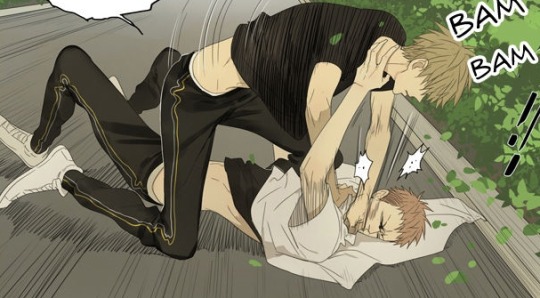
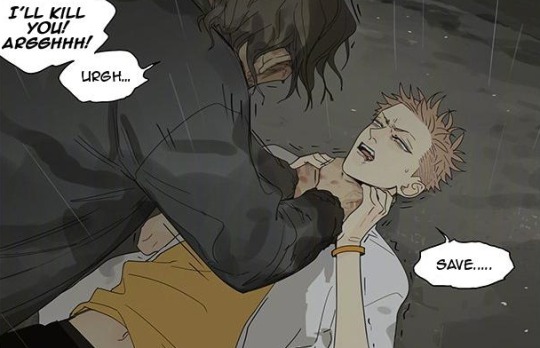
I’m not saying it’s not possible. The physical positions are similar, and I’m sure almost being killed by someone who’s mentally unstable must have been traumatizing. However, I see MGS picking up the rock having different kinds of motives. Also, these two panels are so far from each other publishing-wise that I would be hesitant to draw that many conclusions between them.
The way I see it, MGS was in a position in which he had to win that fight against ZZX. He was the boss of his group of delinquents, and if people didn’t respect him (or rather, fear him) why would his underlings? You can see that if you look at the situation that ultimately led to the fight (ch. 116):
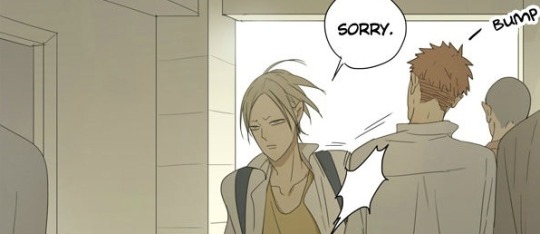
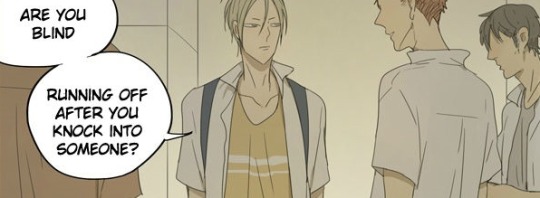
JY bumped into MGS, and it seemed like his “sorry” was somewhat half-hearted. At least to MGS. He made an issue out of it and stopped JY in his tracks. The thing is, as soon as he did that, he put himself in a corner. The only acceptable outcome for him was that JY apologized properly, at the least. Otherwise, someone clearly weaker than MGS had just refused him in front of his own group.
As we know, HT stepped in and raised MGS’s challenge forcing him to back off. After which MGS basically stomped around school cursing and punching walls.
I see MGS being in a similar situation when fighting with ZZX. Only this time, it seemed to be amped up more (ch. 125, 126):
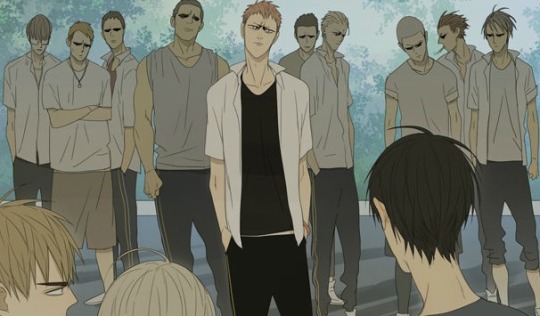
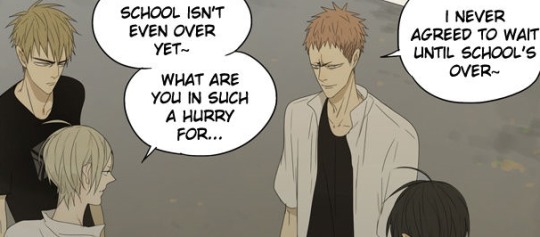
It sounded like MGS had threatened to get JY later and the whole group seemed geared up and ready to go at it. In that fight, MGS had everything to lose. If he couldn’t come out on top, his underlings could start questioning his position as the boss.
All of that is what I see as the buildup for MGS to pick up the rock and smash ZZX in the head with it (ch. 127):
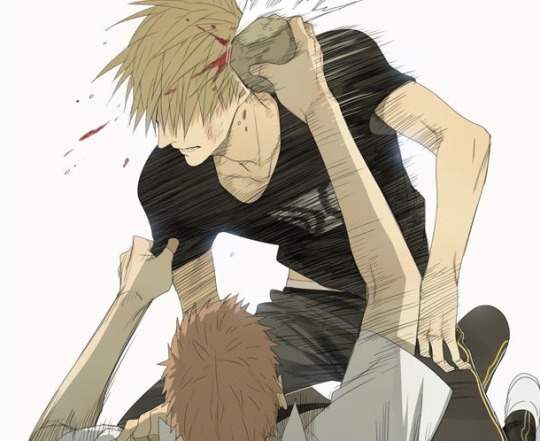
I don’t think he was remembering traumatizing things from the past but rather it seemed he was losing a fight he couldn’t afford to lose. I would say MGS is a good fighter but it seemed he was being overpowered (and taken aback?) by ZZX’s strength now that he was standing up for JY. Surely he would have won against JY but ZZX proved to be another matter. To me, picking up that rock was an act of desperation in terms of making sure he won rather than him having some kinds of flashbacks of the homeless man attacking him.
Another reason why I’m hesitant to draw such conclusions is that ch. 127 and 319 were published years apart in real life. I often refrain from putting much significance on the author’s intentions when forming my own interpretations. And I think this case follows that principle of mine, too. I’m not being hesitant to make this kind of PTSD connection between 127 and 319 because I’m not sure if OX intended it. I’m doubtful because due to the overall nature of 19 Days as a publication, I don’t think I can realistically expect the characters to stay that consistent for 5-or-so years. I’m hesitant to put the begin-versions of them next to the current versions and treat them the same without considering the realistic possibility that there have probably been some afterthoughts in their development. To suddenly have the context of ch. 319 for the fight in ch. 127 doesn’t sound likely to me.
But I’m not trying to make it sound like you couldn’t or shouldn’t see a connection between those two chapters. I guess it would make an interesting path to build from there. To me, though, there are other possibilities that sound more likely.
“But later on he started to look like just a nice awkward boy surrounded by bad people ,And that fight was the only instance of him being that violent”
I think that’s simply because we didn’t know MGS when he was fighting ZZX. Immediately after the fight, though, his character starts to gain more sides in our eyes (ch. 130, 138, 144):
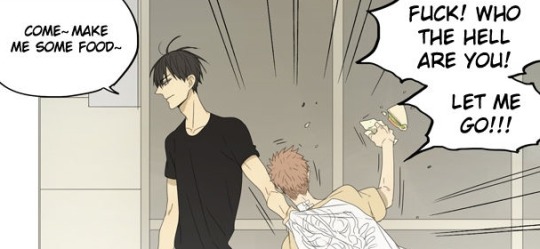
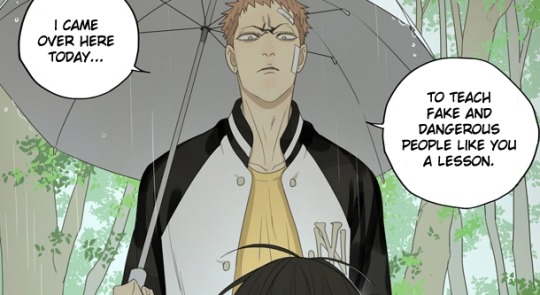
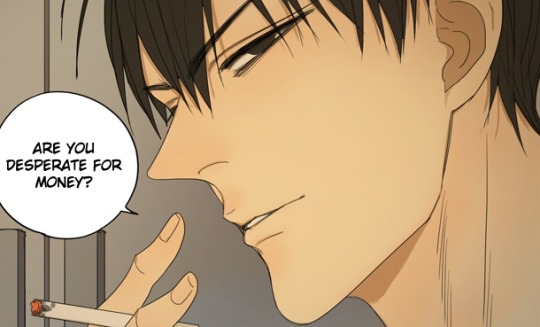
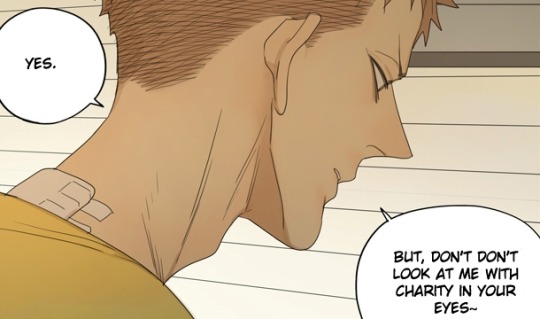
His short fuse and threats gain a more comedic vibe when he gets dragged around by HT. His anger towards humanity and HT especially seems to be fueled by some kind of personal conviction. We’re called to feel sympathetic towards him when his family’s situation is revealed. All of those introduced us to think “hmm, maybe there’s more to him” but they were already factors in his character even when he was fighting ZZX, we just weren’t aware of them yet. When he bashed ZZX with the rock he was the same kid whose family was struggling and who felt like the whole world was rejecting him.
As far as MGS being violent goes, I don’t think he magically started to shy away from it even though it wasn’t as bad as hitting someone with a rock (ch. 130, 138, 148):
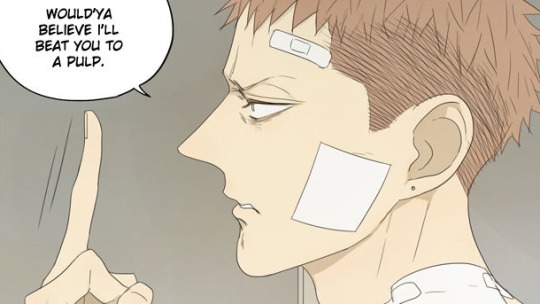
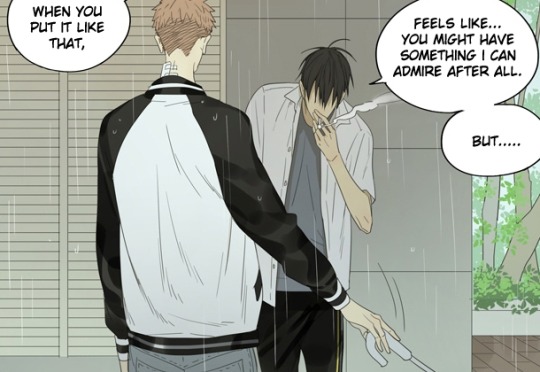
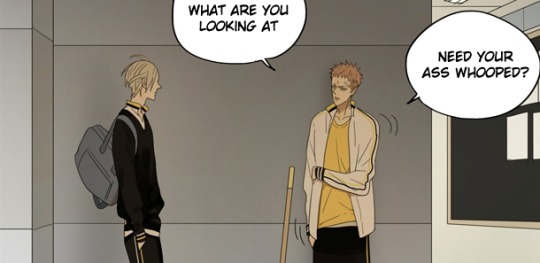
He was still very much physically challenging HT and being overall threatening. But his violence was pretty much rendered useless against HT and the more he threatened to beat anyone up, the more it started to sound like emotional defense in our ears. The violence in MGS gained new sides, and against those discoveries, him bashing ZZX with the rock seems extreme to us. But if you look at the rock situation from the perspective I suggested, it starts to make more sense. MGS’s character development in our eyes starts after his fight with ZZX, but we don’t know how violent he was before that while still being the kid we now know him to be. I doubt he was a stranger to fights given that he was the leader of his group.
It should also be taken into consideration that the overall portrayal of MGS’s delinquent group has changed dramatically over the years. We went from this (ch. 125, 126):

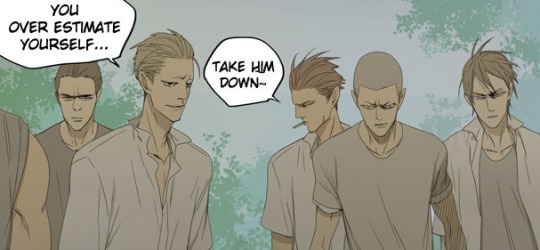
To this (ch. 264, 273):

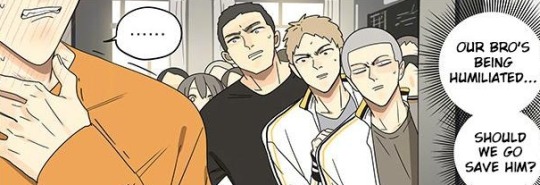
In our eyes, they went from a gang of delinquents seriously ready to beat someone up to a rather comedic group of “followers” who seem almost endearing the way they call MGS their “boss”. I can’t really see the current version of them beating anyone up in the same way as the first time we met them. (This is another example of why I don’t feel like I can comfortably compare the “beginning” of the comic and the “now”. It makes me feel like I’m not really comparing the same characters.) The difference is even clearer if you compare them to the group surrounding SL. He’s very much the antagonist of the story, so his followers are portrayed according to that.
I would say the PTSD/trauma is a nice idea that you could continue to build fan-made material upon but personally, I don’t see that connection in the canon chapters.
Thank you for your question, dear anon! And again, thank you for your patience!
87 notes
·
View notes
Text
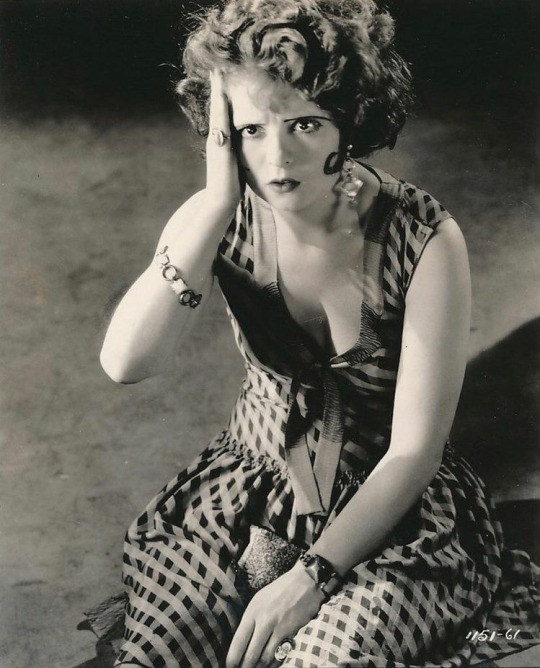
Clara Gordon Bow (July 29, 1905 – September 27, 1965) was an American actress who rose to stardom in silent film during the 1920s and successfully made the transition to "talkies" in 1929. Her appearance as a plucky shopgirl in the film It brought her global fame and the nickname "The It Girl". Bow came to personify the Roaring Twenties and is described as its leading sex symbol.
Bow appeared in 46 silent films and 11 talkies, including hits such as Mantrap (1926), It (1927), and Wings (1927). She was named first box-office draw in 1928 and 1929 and second box-office draw in 1927 and 1930. Her presence in a motion picture was said to have ensured investors, by odds of almost two-to-one, a "safe return". At the apex of her stardom, she received more than 45,000 fan letters in a single month (January 1929).
Two years after marrying actor Rex Bell in 1931, Bow retired from acting and became a rancher in Nevada. Her final film, Hoop-La, was released in 1933. In September 1965, Bow died of a heart attack at the age of 60.
Bow was born in Prospect Heights, Brooklyn at 697 Bergen Street,[9] in a "bleak, sparsely furnished room above [a] dilapidated Baptist Church". Her birth year, according to the US Censuses of 1910 and 1920, was 1905. The 1930 census indicates 1906 and on her gravestone of 1965, the inscription says 1907, but 1905 is the accepted year by a majority of sources.
Bow was her parents' third child, but her two older sisters, born in 1903 and 1904, had died in infancy. Her mother, Sarah Frances Bow (née Gordon, 1880–1923), was told by a doctor not to become pregnant again, for fear the next baby might die as well. Despite the warning, Sarah became pregnant with Clara in late 1904. In addition to the risky pregnancy, a heat wave besieged New York in July 1905, and temperatures peaked around 100 °F (38 °C). Years later, Clara said: "I don't suppose two people ever looked death in the face more clearly than my mother and I the morning I was born. We were both given up, but somehow we struggled back to life."
Bow's parents were descended from English, Irish and Scottish immigrants who had come to America the generation before. Bow said that her father, Robert Walter Bow (1874–1959), "had a quick, keen mind ... all the natural qualifications to make something of himself, but didn't...everything seemed to go wrong for him, poor darling". By the time Clara was four and a half, her father was out of work, and between 1905 and 1923, the family lived at 14 different addresses, but seldom outside Prospect Heights, with Clara's father often absent. "I do not think my mother ever loved my father", she said. "He knew it. And it made him very unhappy, for he worshiped her, always."
When Bow's mother, Sarah, was 16, she fell from a second-story window and suffered a severe head injury. She was later diagnosed with "psychosis due to epilepsy". From her earliest years, Bow had learned how to care for her mother during the seizures, as well as how to deal with her psychotic and hostile episodes. She said her mother could be "mean" to her, but "didn't mean to ... she couldn't help it". Still, Bow felt deprived of her childhood; "As a kid I took care of my mother, she didn't take care of me". Sarah worsened gradually, and when she realized her daughter was set for a movie career, Bow's mother told her she "would be much better off dead". One night in February 1922, Bow awoke to a butcher knife held against her throat by her mother. Clara was able to fend off the attack, and locked her mother up. In the morning, Bow's mother had no recollection of the episode, and later she was committed to a sanatorium by Robert Bow.
Clara spoke about the incident later:
It was snowing. My mother and I were cold and hungry. We had been cold and hungry for days. We lay in each other's arms and cried and tried to keep warm. It grew worse and worse. So that night my mother—but I can't tell you about it. Only when I remember it, it seems to me I can't live.
According to Bow's biographer, David Stenn, Bow was raped by her father at age sixteen while her mother was institutionalized. On January 5, 1923, Sarah died at the age of 43 from her epilepsy. When relatives gathered for the funeral, Bow accused them of being "hypocrites", and became so angry that she even tried to jump into the grave.
Bow attended P.S. 111, P.S. 9, and P.S. 98.[13] As she grew up, she felt shy among other girls, who teased her for her worn-out clothes and "carrot-top" hair. She said about her childhood, "I never had any clothes. ... And lots of time didn't have anything to eat. We just lived, that's about all. Girls shunned me because I was so poorly dressed."
From first grade, Bow preferred the company of boys, stating, "I could lick any boy my size. My right arm was quite famous. My right arm was developed from pitching so much ... Once I hopped a ride on behind a big fire engine. I got a lot of credit from the gang for that."[15] A close friend, a younger boy who lived in her building, burned to death in her presence after an accident. In 1919, Bow enrolled in Bay Ridge High School for Girls. "I wore sweaters and old skirts...didn't want to be treated like a girl...there was one boy who had always been my pal... he kissed me... I wasn't sore. I didn't get indignant. I was horrified and hurt."
Bow's interest in sports and her physical abilities led her to plan for a career as an athletics instructor. She won five medals "at the cinder tracks" and credited her cousin Homer Baker – the national half-mile (c.800 m) champion (1913 and 1914) and 660-yard (c. 600 m) world-record holder – for being her trainer. The Bows and Bakers shared a house – still standing – at 33 Prospect Place in 1920.
In the early 1920s, roughly 50 million Americans—half the population at that time—attended the movies every week. As Bow grew into womanhood, her stature as a "boy" in her old gang became "impossible". She did not have any girlfriends, and school was a "heartache" and her home was "miserable." On the silver screen, however, she found consolation; "For the first time in my life I knew there was beauty in the world. For the first time I saw distant lands, serene, lovely homes, romance, nobility, glamor". And further; "I always had a queer feeling about actors and actresses on the screen ... I knew I would have done it differently. I couldn't analyze it, but I could always feel it.". "I'd go home and be a one girl circus, taking the parts of everyone I'd seen, living them before the glass." At 16, Bow says she "knew" she wanted to be a motion pictures actress, even if she was a "square, awkward, funny-faced kid."
Against her mother's wishes but with her father's support, Bow competed in Brewster publications' magazine's annual nationwide acting contest, "Fame and Fortune", in fall 1921. In previous years, other contest winners had found work in the movies. In the contest's final screen test, Bow was up against an already scene-experienced woman who did "a beautiful piece of acting". A set member later stated that when Bow did the scene, she actually became her character and "lived it". In the January issues 1922 of Motion Picture Classics, the contest jury, Howard Chandler Christy, Neysa McMein, and Harrison Fisher, concluded:
She is very young, only 16. But she is full of confidence, determination and ambition. She is endowed with a mentality far beyond her years. She has a genuine spark of divine fire. The five different screen tests she had, showed this very plainly, her emotional range of expression provoking a fine enthusiasm from every contest judge who saw the tests. She screens perfectly. Her personal appearance is almost enough to carry her to success without the aid of the brains she indubitably possesses.
Bow won an evening gown and a silver trophy, and the publisher committed to help her "gain a role in films", but nothing happened. Bow's father told her to "haunt" Brewster's office (located in Brooklyn) until they came up with something. "To get rid of me, or maybe they really meant to (give me) all the time and were just busy", Bow was introduced to director Christy Cabanne, who cast her in Beyond the Rainbow, produced late 1921 in New York City and released February 19, 1922. Bow did five scenes and impressed Cabanne with true theatrical tears, but was cut from the final print. "I was sick to my stomach," she recalled and thought her mother was right about the movie business.
Bow, who dropped out of school (senior year) after she was notified about winning the contest, possibly in October 1921, got an ordinary office job. However, movie ads and newspaper editorial comments from 1922 to 1923 suggest that Bow was not cut from Beyond the Rainbow. Her name is on the cast list among the other stars, usually tagged "Brewster magazine beauty contest winner" and sometimes even with a picture.
Encouraged by her father, Bow continued to visit studio agencies asking for parts. "But there was always something. I was too young, or too little, or too fat. Usually I was too fat." Eventually, director Elmer Clifton needed a tomboy for his movie Down to the Sea in Ships, saw Bow in Motion Picture Classic magazine, and sent for her. In an attempt to overcome her youthful looks, Bow put her hair up and arrived in a dress she "sneaked" from her mother. Clifton said she was too old, but broke into laughter as the stammering Bow made him believe she was the girl in the magazine. Clifton decided to bring Bow with him and offered her $35 a week. Bow held out for $50 and Clifton agreed, but he could not say whether she would "fit the part". Bow later learned that one of Brewsters' subeditors had urged Clifton to give her a chance.
Down to the Sea in Ships, shot on location in New Bedford, Massachusetts and produced by independent "The Whaling Film Corporation", documented life, love, and work in the whale-hunter community. The production relied on a few less-known actors and local talents. It premiered at the Olympia Theater in New Bedford, on September 25, and went on general distribution on March 4, 1923. Bow was billed 10th in the film, but shone through:
"Miss Bow will undoubtedly gain fame as a screen comedienne".
"She scored a tremendous hit in Down to the Sea in Ships..(and).. has reached the front rank of motion picture principal players".
"With her beauty, her brains, her personality and her genuine acting ability it should not be many moons before she enjoys stardom in the fullest sense of the word. You must see 'Down to the Sea in Ships'".
"In movie parlance, she 'stole' the picture ... ".
By mid-December 1923, primarily due to her merits in Down to the Sea in Ships, Bow was chosen the most successful of the 1924 WAMPAS Baby Stars. Three months before Down to the Sea in Ships was released, Bow danced half nude, on a table, uncredited in Enemies of Women (1923). In spring she got a part in The Daring Years (1923), where she befriended actress Mary Carr, who taught her how to use make-up.
In the summer, she got a "tomboy" part in Grit, a story that dealt with juvenile crime and was written by F. Scott Fitzgerald. Bow met her first boyfriend, cameraman Arthur Jacobson, and she got to know director Frank Tuttle, with whom she worked in five later productions. Tuttle remembered:
Her emotions were close to the surface. She could cry on demand, opening the floodgate of tears almost as soon as I asked her to weep. She was dynamite, full of nervous energy and vitality and pitifully eager to please everyone.
Grit was released on January 7, 1924. The Variety review said "... Clara Bow lingers in the eye, long after the picture has gone."
While shooting Grit at Pyramid Studios, in Astoria, New York, Bow was approached by Jack Bachman of independent Hollywood studio Preferred Pictures. He wanted to contract her for a three-month trial, fare paid, and $50 a week. "It can't do any harm,"[15] he tried. "Why can't I stay in New York and make movies?" Bow asked her father, but he told her not to worry.
On July 21, 1923, she befriended Louella Parsons, who interviewed her for The New York Morning Telegraph. In 1931, when Bow came under tabloid scrutiny, Parsons defended her and stuck to her first opinion on Bow:
She is as refreshingly unaffected as if she had never faced a means to pretend. She hasn't any secrets from the world, she trusts everyone ... she is almost too good to be true ... (I) only wish some reformer who believes the screen contaminates all who associate with it could meet this child. Still, on second thought it might not be safe: Clara uses a dangerous pair of eyes.
The interview also revealed that Bow already was cast in Maytime and in great favor of Chinese cuisine.
On July 22, 1923, Bow left New York, her father, and her boyfriend behind for Hollywood. As chaperone for the journey and her subsequent southern California stay, the studio appointed writer/agent Maxine Alton, whom Bow later branded a liar. In late July, Bow entered studio chief B. P. Schulberg's office wearing a simple high-school uniform in which she "had won several gold medals on the cinder track". She was tested and a press release from early August says Bow had become a member of Preferred Picture's "permanent stock". Alton and she rented an apartment at The Hillview near Hollywood Boulevard. Preferred Pictures was run by Schulberg, who had started as a publicity manager at Famous Players-Lasky, but in the aftermath of the power struggle around the formation of United Artists, ended up on the losing side and lost his job. As a result, he founded Preferred in 1919, at the age of 27.
Maytime was Bow's first Hollywood picture, an adaptation of the popular operetta Maytime in which she essayed "Alice Tremaine". Before Maytime was finished, Schulberg announced that Bow was given the lead in the studio's biggest seasonal assessment, Poisoned Paradise,[51] but first she was lent to First National Pictures to co-star in the adaptation of Gertrude Atherton's 1923 best seller Black Oxen, shot in October, and to co-star with Colleen Moore in Painted People, shot in November.
Director Frank Lloyd was casting for the part of high-society flapper Janet Oglethorpe, and more than 50 women, most with previous screen experience, auditioned. Bow reminisced: "He had not found exactly what he wanted and finally somebody suggested me to him. When I came into his office a big smile came over his face and he looked just tickled to death." Lloyd told the press, "Bow is the personification of the ideal aristocratic flapper, mischievous, pretty, aggressive, quick-tempered and deeply sentimental." It was released on January 4, 1924.
The New York Times said, "The flapper, impersonated by a young actress, Clara Bow, had five speaking titles, and every one of them was so entirely in accord with the character and the mood of the scene that it drew a laugh from what, in film circles, is termed a "hard-boiled" audience", while the Los Angeles Times commented that "Clara Bow, the prize vulgarian of the lot ... was amusing and spirited ... but didn't belong in the picture", and Variety said that "... the horrid little flapper is adorably played ..."
Colleen Moore made her flapper debut in a successful adaptation of the daring novel Flaming Youth, released November 12, 1923, six weeks before Black Oxen. Both films were produced by First National Pictures, and while Black Oxen was still being edited and Flaming Youth not yet released, Bow was requested to co-star with Moore as her kid sister in Painted People (The Swamp Angel). Moore essayed the baseball-playing tomboy and Bow, according to Moore, said "I don't like my part, I wanna play yours." Moore, a well-established star earning $1200 a week—Bow got $200—took offense and blocked the director from shooting close-ups of Bow. Moore was married to the film's producer and Bow's protests were futile. "I'll get that bitch", she told her boyfriend Jacobson, who had arrived from New York. Bow had sinus problems and decided to have them attended to that very evening. With Bow's face now in bandages, the studio had no choice but to recast her part.
During 1924, Bow's "horrid" flapper raced against Moore's "whimsical". In May, Moore renewed her efforts in The Perfect Flapper, produced by her husband. However, despite good reviews, she suddenly withdrew. "No more flappers ... they have served their purpose ... people are tired of soda-pop love affairs", she told the Los Angeles Times, which had commented a month earlier, "Clara Bow is the one outstanding type. She has almost immediately been elected for all the recent flapper parts". In November 1933, looking back to this period of her career, Bow described the atmosphere in Hollywood as like a scene from a movie about the French Revolution, where "women are hollering and waving pitchforks twice as violently as any of the guys ... the only ladies in sight are the ones getting their heads cut off."
By New Year 1924, Bow defied the possessive Maxine Alton and brought her father to Hollywood. Bow remembered their reunion: "I didn't care a rap, for (Maxine Alton), or B. P. Schulberg, or my motion picture career, or Clara Bow, I just threw myself into his arms and kissed and kissed him, and we both cried like a couple of fool kids. Oh, it was wonderful." Bow felt Alton had misused her trust: "She wanted to keep a hold on me so she made me think I wasn't getting over and that nothing but her clever management kept me going." Bow and her father moved in at 1714 North Kingsley Drive in Hollywood, together with Jacobson, who by then also worked for Preferred. When Schulberg learned of this arrangement, he fired Jacobson for potentially getting "his big star" into a scandal. When Bow found out, "She tore up her contract and threw it in his face and told him he couldn't run her private life." Jacobson concluded, "[Clara] was the sweetest girl in the world, but you didn't cross her and you didn't do her wrong." On September 7, 1924, The Los Angeles Times, in a significant article "A dangerous little devil is Clara, impish, appealing, but oh, how she can act!", her father is titled "business manager" and Jacobson referred to as her brother.
Bow appeared in eight releases in 1924.
In Poisoned Paradise, released on February 29, 1924, Bow got her first lead. "... the clever little newcomer whose work wins fresh recommendations with every new picture in which she appears". In a scene described as "original", Bow adds "devices" to "the modern flapper": she fights a villain using her fists, and significantly, does not "shrink back in fear".
In Daughters of Pleasure, also released on February 29, 1924, Bow and Marie Prevost "flapped unhampered as flappers De luxe ... I wish somebody could star Clara Bow. I'm sure her 'infinite variety' would keep her from wearying us no matter how many scenes she was in."
Loaned out to Universal, Bow top-starred, for the first time, in the prohibition, bootleg drama/comedy Wine, released on August 20, 1924. The picture exposes the widespread liquor traffic in the upper classes, and Bow portrays an innocent girl who develops into a wild "red-hot mama".
"If not taken as information, it is cracking good entertainment," Carl Sandburg reviewed September 29.
"Don't miss Wine. It's a thoroughly refreshing draught ... there are only about five actresses who give me a real thrill on the screen—and Clara is nearly five of them".
Alma Whitaker of The Los Angeles Times observed on September 7, 1924:
She radiates sex appeal tempered with an impish sense of humor ... She hennas her blond hair so that it will photograph dark in the pictures ... Her social decorum is of that natural, good-natured, pleasantly informal kind ... She can act on or off the screen—takes a joyous delight in accepting a challenge to vamp any selected male—the more unpromising specimen the better. When the hapless victim is scared into speechlessness, she gurgles with naughty delight and tries another.
Bow remembered: "All this time I was 'running wild', I guess, in the sense of trying to have a good time ... maybe this was a good thing, because I suppose a lot of that excitement, that joy of life, got onto the screen."
In 1925, Bow appeared in 14 productions: six for her contract owner, Preferred Pictures, and eight as an "out-loan".
"Clara Bow ... shows alarming symptoms of becoming the sensation of the year ... ", Motion Picture Classic Magazine wrote in June, and featured her on the cover.
I'm almost never satisfied with myself or my work or anything...by the time I'm ready to be a great star I'll have been on the screen such a long time that everybody will be tired of seeing me...(Tears filled her big round eyes and threatened to fall).
I worked in two and even three pictures at once. I played all sorts of parts in all sorts of pictures ... It was very hard at the time and I used to be worn out and cry myself to sleep from sheer fatigue after 18 hours a day on different sets, but now [late 1927] I am glad of it.
Preferred Pictures loaned Bow to producers "for sums ranging from $1500 to $2000 a week" while paying Bow a salary of $200 to $750 a week. The studio, like any other independent studio or theater at that time, was under attack from "The Big Three", MPAA, which had formed a trust to block out Independents and enforce the monopolistic studio system. On October 21, 1925, Schulberg filed Preferred Pictures for bankruptcy, with debts at $820,774 and assets $1,420. Three days later, it was announced that Schulberg would join with Adolph Zukor to become associate producer of Paramount Pictures, "catapulted into this position because he had Clara Bow under personal contract".
Adolph Zukor, Paramount Picture CEO, wrote in his memoirs: "All the skill of directors and all the booming of press-agent drums will not make a star. Only the audiences can do it. We study audience reactions with great care." Adela Rogers St. Johns had a different take: in 1950, she wrote, "If ever a star was made by public demand, it was Clara Bow." And Louise Brooks (from 1980): "(Bow) became a star without nobody's help ..."
The Plastic Age was Bow's final effort for Preferred Pictures and her biggest hit up to that time. Bow starred as the good-bad college girl, Cynthia Day, against Donald Keith. It was shot on location at Pomona College in the summer of 1925, and released on December 15, but due to block booking, it was not shown in New York until July 21, 1926.
Photoplay was displeased: "The college atmosphere is implausible and Clara Bow is not our idea of a college girl."
Theater owners, however, were happy: "The picture is the biggest sensation we ever had in our theater ... It is 100 per cent at the box-office."
Some critics felt Bow had conquered new territory: "(Bow) presents a whimsical touch to her work that adds greater laurels to her fast ascending star of screen popularity."
Time singled out Bow: "Only the amusing and facile acting of Clara Bow rescues the picture from the limbo of the impossible."
Bow began to date her co-star Gilbert Roland, who became her first fiancé. In June 1925, Bow was credited for being the first to wear hand-painted legs in public, and was reported to have many followers at the Californian beaches.
Throughout the 1920s, Bow played with gender conventions and sexuality in her public image. Along with her tomboy and flapper roles, she starred in boxing films and posed for promotional photographs as a boxer. By appropriating traditionally androgynous or masculine traits, Bow presented herself as a confident, modern woman.
"Rehearsals sap my pep," Bow explained in November 1929, and from the beginning of her career, she relied on immediate direction: "Tell me what I have to do and I'll do it." Bow was keen on poetry and music, but according to Rogers St. Johns, her attention span did not allow her to appreciate novels. Bow's focal point was the scene, and her creativity made directors call in extra cameras to cover her spontaneous actions, rather than holding her down.
Years after Bow left Hollywood, director Victor Fleming compared Bow to a Stradivarius violin: "Touch her, and she responded with genius." Director William Wellman was less poetic: "Movie stardom isn't acting ability—it's personality and temperament ... I once directed Clara Bow (Wings). She was mad and crazy, but WHAT a personality!". And in 1981, Budd Schulberg described Bow as "an easy winner of the dumbbell award" who "couldn't act," and compared her to a puppy that his father B. P. Schulberg "trained to become Lassie."
In 1926, Bow appeared in eight releases: five for Paramount, including the film version of the musical Kid Boots with Eddie Cantor, and three loan-outs that had been filmed in 1925.
In late 1925, Bow returned to New York to co-star in the Ibsenesque drama Dancing Mothers, as the good/bad "flapperish" upper-class daughter Kittens. Alice Joyce starred as her dancing mother, with Conway Tearle as "bad-boy" Naughton. The picture was released on March 1, 1926.
"Clara Bow, known as the screen's perfect flapper, does her stuff as the child, and does it well."
"... her remarkable performance in Dancing Mothers ... ".
Louise Brooks remembered: "She was absolutely sensational in the United States ... in Dancing Mothers ... she just swept the country ... I know I saw her ... and I thought ... wonderful."
On April 12, 1926, Bow signed her first contract with Paramount: "...to retain your services as an actress for the period of six months from June 6, 1926 to December 6, 1926, at a salary of $750.00 per week...".
In Victor Fleming's comedy-triangle, Mantrap, Bow, as Alverna the manicurist, cures lonely hearts Joe Easter (Ernest Torrence), of the great northern, as well as pill-popping New York divorce attorney runaway Ralph Prescott (Percy Marmont). Bow commented: "(Alverna)...was bad in the book, but—darn it!—of course, they couldn't make her that way in the picture. So I played her as a flirt." The film was released on July 24, 1926.
Variety: "Clara Bow just walks away with the picture from the moment she walks into camera range."
Photoplay: "When she is on the screen nothing else matters. When she is off, the same is true."
Carl Sandburg: "The smartest and swiftest work as yet seen from Miss Clara Bow."
The Reel Journal: "Clara Bow is taking the place of Gloria Swanson...(and)...filling a long need for a popular taste movie actress."
On August 16, 1926, Bow's agreement with Paramount was renewed into a five-year deal: "Her salary will start at $1700 a week and advance yearly to $4000 a week for the last year."[78] Bow added that she intended to leave the motion picture business at the expiration of the contract, i.e., in 1931.
In 1927, Bow appeared in six Paramount releases: It, Children of Divorce, Rough House Rosie, Wings, Hula and Get Your Man. In the Cinderella story It, the poor shop-girl Betty Lou Spence (Bow) conquers the heart of her employer Cyrus Waltham (Antonio Moreno). The personal quality —"It"— provides the magic to make it happen. The film gave Bow her nickname, "The 'It' Girl."
The New York Times: "(Bow)...is vivacious and, as Betty Lou, saucy, which perhaps is one of the ingredients of It."
The Film Daily: "Clara Bow gets a real chance and carries it off with honors...(and)...she is really the whole show."
Carl Sandburg: "'It' is smart, funny and real. It makes a full-sized star of Clara Bow."
Variety: "You can't get away from this Clara Bow girl. She certainly has that certain 'It'...and she just runs away with the film."
Dorothy Parker is often said to have referred to Bow when she wrote, "It, hell; she had Those."[109] Parker in actuality was not referring to Bow or to Bow's character in the film It, but to a different character, Ava Cleveland, in the novel of the same name.
In 1927, Bow starred in Wings, a war picture rewritten to accommodate her, as she was Paramount's biggest star, but was not happy about her part: "[Wings is]...a man's picture and I'm just the whipped cream on top of the pie." The film went on to win the first Academy Award for Best Picture. In 1928, Bow appeared in four Paramount releases: Red Hair, Ladies of the Mob, The Fleet's In, and Three Weekends, all of which are lost.
Adela Rogers St. Johns, a noted screenwriter who had done a number of pictures with Bow, wrote about her:
There seems to be no pattern, no purpose to her life. She swings from one emotion to another, but she gains nothing, stores up nothing for the future. She lives entirely in the present, not even for today, but in the moment. Clara is the total nonconformist. What she wants she gets, if she can. What she desires to do she does. She has a big heart, a remarkable brain, and the most utter contempt for the world in general. Time doesn't exist for her, except that she thinks it will stop tomorrow. She has real courage, because she lives boldly. Who are we, after all, to say she is wrong?
Bow's bohemian lifestyle and "dreadful" manners were considered reminders of the Hollywood elite's uneasy position in high society. Bow fumed: "They yell at me to be dignified. But what are the dignified people like? The people who are held up as examples for me? They are snobs. Frightful snobs ... I'm a curiosity in Hollywood. I'm a big freak, because I'm myself!"
MGM executive Paul Bern said Bow was "the greatest emotional actress on the screen", "sentimental, simple, childish and sweet," and considered her "hard-boiled attitude" a "defense mechanism".
With "talkies" The Wild Party, Dangerous Curves, and The Saturday Night Kid, all released in 1929, Bow kept her position as the top box-office draw and queen of Hollywood.
Neither the quality of Bow's voice nor her Brooklyn accent was an issue to Bow, her fans, or Paramount. However, Bow, like Charlie Chaplin, Louise Brooks, and most other silent film stars, did not embrace the novelty: "I hate talkies ... they're stiff and limiting. You lose a lot of your cuteness, because there's no chance for action, and action is the most important thing to me." A visibly nervous Bow had to do a number of retakes in The Wild Party because her eyes kept wandering up to the microphone overhead. "I can't buck progress .. I have to do the best I can," she said. In October 1929, Bow described her nerves as "all shot", saying that she had reached "the breaking point", and Photoplay cited reports of "rows of bottles of sedatives" by her bed.
According to the 1930 census, Bow lived at 512 Bedford Drive, together with her secretary and hairdresser, Daisy DeBoe (later DeVoe), in a house valued $25,000 with neighbors titled "Horse-keeper", "Physician", "Builder". Bow stated she was 23 years old, i.e., born 1906, contradicting the censuses of 1910 and 1920.
"Now they're having me sing. I sort of half-sing, half-talk, with hips-and-eye stuff. You know what I mean—like Maurice Chevalier. I used to sing at home and people would say, 'Pipe down! You're terrible!' But the studio thinks my voice is great."
With Paramount on Parade, True to the Navy, Love Among the Millionaires, and Her Wedding Night, Bow was second at the box-office only to Joan Crawford in 1930. With No Limit and Kick In, Bow held the position as fifth at box-office in 1931, but the pressures of fame, public scandals, overwork, and a damaging court trial charging her secretary Daisy DeVoe with financial mismanagement, took their toll on Bow's fragile emotional health. As she slipped closer to a major breakdown, her manager, B.P. Schulberg, began referring to her as "Crisis-a-day-Clara". In April, Bow was brought to a sanatorium, and at her request, Paramount released her from her final undertaking: City Streets (1931). At 25, her career was essentially over.
B.P. Schulberg tried to replace Bow with his girlfriend Sylvia Sidney, but Paramount went into receivership, lost its position as the biggest studio (to MGM), and fired Schulberg. David Selznick explained:
...[when] Bow was at her height in pictures we could make a story with her in it and gross a million and a half, where another actress would gross half a million in the same picture and with the same cast.
Bow left Hollywood for Rex Bell's ranch in Nevada, her "desert paradise", in June[120] and married him in then small-town Las Vegas in December. In an interview on December 17, Bow detailed her way back to health: sleep, exercise, and food, and the day after[122] she returned to Hollywood "for the sole purpose of making enough money to be able to stay out of it."
Soon, every studio in Hollywood (except Paramount) and even overseas wanted her services. Mary Pickford stated that Bow "was a very great actress" and wanted her to play her sister in Secrets (1933), Howard Hughes offered her a three-picture deal, and MGM wanted her to star in Red-Headed Woman (1932). Bow agreed to the script, but eventually rejected the offer since Irving Thalberg required her to sign a long-term contract.
On April 28, 1932, Bow signed a two-picture deal with Fox Film Corporation, for Call Her Savage (1932) and Hoop-La (1933). Both were successful; Variety favored the latter. The October 1934, Family Circle Film Guide rated the film as "pretty good entertainment", and of Miss Bow said: "This is the most acceptable bit of talkie acting Miss Bow has done." However, they noted, "Miss Bow is presented in her dancing duds as often as possible, and her dancing duds wouldn't weigh two pounds soaking wet." Bow commented on her revealing costume in Hoop-La: "Rex accused me of enjoying showing myself off. Then I got a little sore. He knew darn well I was doing it because we could use a little money these days. Who can't?"
Bow reflected on her career:
My life in Hollywood contained plenty of uproar. I'm sorry for a lot of it but not awfully sorry. I never did anything to hurt anyone else. I made a place for myself on the screen and you can't do that by being Mrs. Alcott's idea of a Little Woman.
Bow and actor Rex Bell (later a lieutenant governor of Nevada) had two sons, Tony Beldam (born 1934, changed name to Rex Anthony Bell, Jr., died July 8, 2011) and George Beldam, Jr. (born 1938). Bow retired from acting in 1933. In September 1937, she and Bell opened The 'It' Cafe in the Hollywood Plaza Hotel at 1637 N Vine Street near Hollywood Boulevard in Los Angeles. It closed in 1943. Her last public performance, albeit fleeting, came in 1947 on the radio show Truth or Consequences. Bow was the mystery voice in the show's "Mrs. Hush" contest.
Bow eventually began showing symptoms of psychiatric illness. She became socially withdrawn, and although she refused to socialize with her husband, she also refused to let him leave the house alone. In 1944, while Bell was running for the U.S. House of Representatives, Bow tried to commit suicide. A note was found in which Bow stated she preferred death to a public life.
In 1949, she checked into the Institute of Living to be treated for her chronic insomnia and diffuse abdominal pains. Shock treatment was tried and numerous psychological tests performed. Bow's IQ was measured "bright normal", while others claimed she was unable to reason, had poor judgment and displayed inappropriate or even bizarre behavior. Her pains were considered delusional and she was diagnosed with schizophrenia; however, she experienced neither auditory nor visual hallucinations. Analysts tied the onset of the illness, as well as her insomnia, to the "butcher knife episode" back in 1922, but Bow rejected psychological explanations and left the Institute. She did not return to her family. After leaving the institution, Bow lived alone in a bungalow, which she rarely left, until her death.
Bow spent her last years in Culver City, under the constant care of a nurse, Estalla Smith, living off an estate worth about $500,000 at the time of her death. In 1965, at age 60, she died of a heart attack, which was attributed to atherosclerosis discovered in an autopsy. She was interred in the Freedom Mausoleum, Sanctuary of Heritage at Forest Lawn Memorial Park Cemetery in Glendale, California. Her pallbearers were Harry Richman, Richard Arlen, Jack Oakie, Maxie Rosenbloom, Jack Dempsey, and Buddy Rogers.
9 notes
·
View notes
Text
Things i didn't like about the little women 2019 movie.
Hello my lovelies! I am back today with my second part of my previous little women review, this section as you could probably tell is based around all the issues I had with the movie, but I do want to put a little disclaimer. I am sure some of my points will have explanations if not, more detail about the points I will be making but due to the fact I haven't read much of the book I am looking at this with no previous knowledge and just the information and story I was provided with from the film, I also want to make clear majority of these issues are with the story not the actual movie creation and direction. So with that in mind, please be kind and lets dive in!
Laurie's character development.
Now before I start I want to make it clear, I liked the character of Laurie initially, the first few scenes we see him in he is fun loving, carefree and just a big kid. We see him absolutely flourish within the girls company but yet the huge 180 in his over all character was a little alien to me and left me feeling very confused and if I'm honest, a little irritated. His demeanour in the second half of the movie is so very different. We see him change from his childish self to this very self absorbed and self destructive person, for example when we attends the ball and sees Amy, he is sloppily dressed, drunk and extremely ill mannered, completely disregarding the stress and repercussions that this situation will later cause Amy. Which is so contradictory to his earlier caring nature we grew to love.
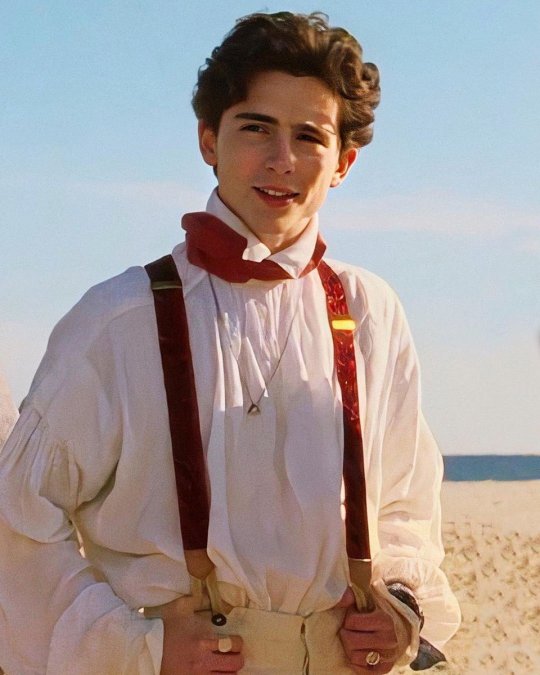
Another prime example is again, when he approaches Amy in the gardens when she is sketching, he comes across so egotistical and smarmy. Almost expecting Amy when faced with his advances to fall to her knees and become so grateful he has even graced her by seeing her in a romantic light. Which is a disgusting trait in any male or female character. Are we expected to believe that years later, Jo's rejection is still playing so heavily in his mind it has caused him to spiral? We have all faced breakups, rejections and unrequited love and while yes they are hard to deal with and can see, soul destroy at he time we inevitably move on and learn from them which Laurie clearly hasn't. Which leads me to my next point.
Amy.
Yes, Amy hands down is my favourite character as I see her as the most layered out of all the girls but the story line with Laurie just frustrated my inner independent woman.
Going back to the garden scene with her and Laurie, we see her completely tear him down, we see her show him strength regardless of how hard it was for her to contain her feelings, feeling which we are told have been building for years, we see her explain to him the hurt and offence he has caused her while confessing his so called feelings to her because when you think of it from her point of view, she has had feelings for him from a very young age, but has accepted that is her burden to carry and that she has no hand in his feelings for Jo which is a hard situation but is out of her control and sadly, is out of his. A typical and heart breaking case of unrequited love. so really there is no blame and no insult shared, yet when Jo rejects him he decides that Amy is his next best shot and he begins to play on his knowledge of her feelings for him and use this to his own personal advantage by manipulating her feelings and falling back onto plan B.

All of this she is aware of an refuses to subject her self to such degrading actions, which is something we rarely see happen in movies, and had me really feeling for her. Stuck in a hard place of heart break and inner strength BUT hard cut to the ending of the movie, we find that she had disregarded all those facts and feelings by giving into Laurie and we learn they have in fact married. Which just left me very shocked and disappointed in her. I expected this from Laurie but not Amy.
Laurie's confession.
Now this, this scene hurt my heart and angered my soul for many reasons. When Laurie informs Jo of his marriage my heart broke for her, because he did it in such a heartless way, which in turn solidified my belief that Laurie's intentions were to hurt Jo in this scene and that was all that was behind it. When you really look at it, you can say he didn't know of Jo’s feelings towards him, but why then tell her he will always have feelings for her, because if he genuinely believed that he wouldn't have felt the need to soften the blow by confessing that. It makes no sense! He continues to tell her his love for Amy is very different, that's it's real love, not puppy love. Knowing of their past, and knowing the intense relationship romantic or not his delivery boarders on nasty in it's careless delivery.

Yes, I am aware Jo made it clear she had no romantic feelings for Laurie but It was so very obvious that Jo was just scared, she was scared of loosing who she was to a man so much so that she rejected him and if he really knew her as well as I know he did he could see the situation for what it really was, a scared young girl pressured into making a decision that she felt would change not only her life but herself. He could always see through her lies, so why not now? No. Laurie was hurt by her rejection and whether it was subconsciously or not, he wanted to tell her the news see her reaction and hurt her the way she hurt him.
Have you ever made a joke about something to someone and they pretend they're fine with it but really you know it's caused offence or upset because they keep referring to it and bringing it up? Yeah, well Laurie brings up his past relationship with Jo two three times in the space of about five minutes, in front of a variety of people which include his wife. Not only does that show he has not moved on as he so clearly claims, but that again he disregards his wife's feelings and upset through this specific comment.
The timing of said confession.
Can we also take a second to talk about the god damn timing?! He decides to tell her, on the day of her sister funeral, are you joking?! How entitled do you have to be to think your new marriage takes precedence over the death of a person and not just anyone, a close friend and sister of you, your wife and your life long friends. if i have by chance got my timelines messed up please correct me because this was just a shock to me when watching.
Now don't worry, I'm going to stop ripping these characters apart now and move on to one other issue I had. I know all of these will most probably be a little controversial and I remind you, this is just an opinion post so please be respectful, but...
Jo and Friedrich Bhaer.
While I am of the opinion Jo and Laurie should of been together, I promise in spite of the beginning of this post I'm not bitter about it. But this was another match I wasn't feeling. I understand that relationships aren't perfect, and sometime you can't force what may appear to be the perfect and ideal match but these two were a bit of stretch.
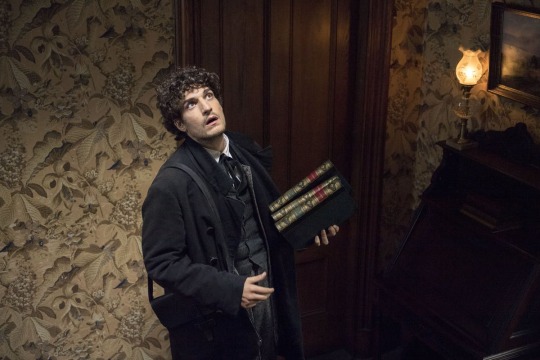
The fact that this was the man who was supposed to change Jo’s mind about marriage(something her unofficial childhood sweetheart couldn't manage)and he had about as much chemistry with our girl as I have with my current diet was just straight up disappointing. I mean, Something's just aren't meant to be and this, is one of them. Throughout the movie, their relationship seemed strained, and not in the cute love hate cliche we see a lot of, but In a very fractured and unhealthy way. The whole thing I felt was a stretch, there is no time spent developing their relationship apart from an exchange of a few minor looks between the two of what I'm assuming is supposed demonstrate some type of affection and longing. Eye roll.
I am aware the movie does make fun of this ending and mock its absurdity due to the way it portrays the publishers pushing for a perfect if not cliche romantic ending and while I do appreciate that that initial forced ending is something I just couldn't get over and had to include.
And that my friends, are all the issues I had with little women. Although, regardless of these issues I still did love this movie with my whole heart and the affection I felt for this film completely over shadows this negativity. No movie or story will be perfect. Movies and books are so personal and everyone will have a difference of opinions which is what I love about them so please let me know your thoughts below. Until next time have a fantastic week!
Over all rating : 8.5/10.
Love, love, love love.
#little women#little women 2019#little women movie#little women movie 2019#little women movie review 2019#the march girls#jo march#meg march#beth march#amy march#timothee chalamet#emma watson#Florence Pugh#Eliza Scanlen#little women book#movie review#things i didnt like about
21 notes
·
View notes
Note
How did you develop your writing style? It's so unique and descriptive. Did you take inspiration from anyone and build on that, or was it more like writing until you gradually became better at it? I'm having a crisis because I want to develop a distinct writing style, but I don't know how. I don't know if you can compare it to an artist finding their style or not, so I don't really know what to expect. eh, sorry if this didn't make any sense (ᵕ̣̣̣̣̣̣﹏ᵕ̣̣̣̣̣̣)
Very interesting ask.
Thank you for the kind words in the beginning of your ask, first of all. I think this is a very important thing to address for writers in general because it’s a struggle that we all go through at one point. And, for others, it’s a constant battle… for most, if not all, it’s a necessity.
I’ll be answering this in two parts, because one is more personal while the other is more objective. I hope that these answers and thoughts will help in some capacity.
We’ll go with the objective one first. (This will be long. Sorry. I can’t answer this question in a short way without any depth.)
. Where Do You Aim When Crafting Your Writing Style? .
Anon, if I were to be honest, the actual act of aiming to develop a distinct style, rather than focus on developing your craft in terms of grammar, syntax, and variation in imagery, leads to obstacles more than anything.
I know from personal experience that being obsessed with being different (and this is more recent in my years as a developing writer, rather than towards the beginning) prolongs the frustrations and even causes writers to stumble and overthink about their style.
I can’t tell you how many times I’ve struggled with enjoying my own writing because of my very descriptive use of words and imagery, even though that’s what differentiates me as a writer.
(And there are plenty of flaws that develop with every single style, and I can tell you a dozen frustrations I have for every one positive thing I like about my own. Of course, that will be expanded on later.)
The first step into coming into your own writing style, Anon, is understanding that trying too hard to emulate another’s style will only halt you in crafting your own. There is nothing wrong with drawing influence and finding inspiration in authors, of course, because that’s how we function.
There is nothing wrong with wanting to be similar or even outshine the authors we admire, whether it’s in terms of the actual style itself, the content, the plots, the characters, the settings, etc. In fact, it’s encouraged for writers to explore the secrets and methods that the most esteemed and successful authors use, because that’s where you learn.
Writing is, in fact, an extremely meticulous and even mechanical process. There is a sort of science (if you want to view it that way) to the way stories are structured, how certain styles work with certain readers and so on.
Your motivations behind why you want to develop a distinct style should be made clear before you move forward with practicing and continuously exploring what you have to offer for yourself, rather than your wish to imitate other people.
Now, there are countless different ways you can discuss the writing styles of different authors. For one thing, there’s a very descriptive elegance and simple depth that is often found in the works of Ian McEwan, for instance, the author of Atonement, Nutshell, and Sweet Tooth.
His style is very heavy on summarization of his characters, almost, which can either draw the reader in or immediately turn them off. Some absolutely despise this style because they claim it lacks depth or connection between the reader and the characters.
I absolutely love Ian McEwan. I’m one of millions of readers who enjoy his style, and I oppose the viewpoints of millions of readers who absolutely detest his style. But what makes Ian McEwan Ian McEwan is… well, Ian McEwan’s writing style and process.
When you criticize or praise Ian McEwan, you’re not criticizing his style for emulating J.K. Rowling or George R.R. Martin or C.S. Lewis or any other writer, but your’e criticizing and praising him for his style. He is well into his own work because, through being influenced and learning from his own idols, he’s grown into his own style.
Ian McEwan’s style, not a… say, “polished imitation of Rowling or Martin.”
It’s just his own.
This is a very important differentiator because it’s incredibly easy to become enveloped in the idea of wanting to be the “next J.K. Rowling” or the “next Stephen King.” I guarantee that it happens to every writer, and maybe my opinion isn’t exactly universally viewed as accurate in this regard, but I think this is a dangerous way to view writing.
Desperately trying to emulate another’s style through forced, unnatural and exhausting means, leads to burnouts and a quick recession of passion and even frustration that you can’t even pinpoint as a writer.
You will often ask yourself: “Why isn’t this working? I’m doing exactly what my favorite author is doing!”
And that, right there, is where you know you’ve slammed headfirst into a wall.
Do you write because you want to express the style of a different author? Or do you write because you want to express yourself?
Most, if not all, writers would say: “well, obviously myself. Why else would I write? I’m not trying to copy every other person out there.”
Of course writers aren’t always actively trying to do just that, but sometimes it’s inevitable when you’re focused so intensely on wanting to create your own style amidst a pool of millions of writers who could not be more different. Sure, some styles are going to be similar no matter what, but there are always elements that show your personality as the author in your work.
You should write, ultimately, for yourself first before anyone else. Thus, your style should be, ultimately, you.
How do you become a better writer? You read and you write every day. It’s a simple, yet very tasking process, and part of what, of course, draws from us, as writers, to look to our idols and what causes us to create a new style based off of what we know.
It’s the basic fundamental of writing, from beginners to the most advanced and successful published authors around (and beyond).
So, instead of aiming to mimic other styles and trying too hard to emulate your favorite authors, start with drawing inspiration from them and just… losing yourself, to a few tries. In order to evolve into your own style, you must freely write and just let your typing/writing fingers speak for themselves.
It’s a very daring process and it’s extremely difficult to do, especially for over-thinkers like myself, but trust me, the payoff is absolutely rewarding.
[ Alright, moving on to the more personal aspect. There will be answers that aren’t explored in this one because they should be exemplified more in the second half of this post. Fair warning. ]
. So, Let’s Talk About the Relationship Between Style and Writer .
Oh, boy.
Honestly, this ask resonated so much with me personally that it’s difficult to write all of this out, but it’s important. And, as much as I actually detest and obsess over changing my style each and every day, there’s something I need to make clear about how it works in general.
My style actually fluctuates depending on which tense I’m writing.
In fanfiction, I often write in present-tense. Why? It’s fast. It’s quick. It immediately appeals to the senses and allows more freedom and control over the characters in how they move, talk, etc. It also motivates me to write faster because this type of style emulates how I dabbled in poetry, which I’m very fond of.
My writing is… very descriptive, yes, but this started out as my biggest flaw. In fact, it’s still considered a flaw.
Sometimes I use far too many adverbs and far too many words to reach a certain point, and overly describe each scene and movement between characters because of how specific and vivid my visions are for each story.
It’s part of my controlling nature as a writer. Boohoo, I’m a horrible person. Whatever.
Usually when I reread my drafts (which is either obsessively repeated or not done at all…) I cut away the excess descriptions because, ever since I started writing, I would over-write. I was desperate and even more insecure in my craft, and it showed.
When I write original works, I write in the past-tense. And, strangely enough, my style just… changes.
It’s often recommended not to have different writing styles for certain settings. If I had to simplify my style I would say it’s very descriptive and is pretty minute in what it pays attention to, but it can get lost in the fray and is usually best observed between character interactions and descriptions of scenes upon envisioning them for the first time.
My past-tense style, when compared side-by-side with my present-tense, holds some key similarities but are, ultimately, quite different. It’s more blunt, still highly visual and sensual, but it is still, essentially, my style.
Everyone develops their style in a different way and over time through practice and just… discovering what you enjoy most about writing.
Do you love appealing to the senses the most?
Do you love imagining landscapes and describing the different ways a sunset or sunrise can look?
Do you love architecture? Buildings? Moss on the walls? Thorns on a vine? What roses smell like in winter if they still retain their fragrance?
Do you love witty banter and short, snappy descriptions and fast-paced action?
Do you love dialogue more than the setting?
Do you love the setting more than the dialogue?
Do you love both equally and seek a balance?
Do you love slow-building drama and angst?
Do you love describing economics and politics?
Do you love describing romance and sex?
Do you love laying out emotions as they are bluntly or relating them to more palpable things?
Do you love fantasy? Contemporary? Thriller? Mystery? All of them? Everything and anything in-between?
Do you love more minute or expanded details?
Do you love skipping over details in general and just going straight to the point?
Do you love writing?
All of these aspects and many, many more, make up the many different styles that writers wield and hone to their own ability each and every day. It requires discipline, a lot of practice, insight, and willingness to delve deep into oneself and think: “will I like reading what I put down?”
Be honest with yourself. Experiment. Try new things. It’s normal to be confused and stuck in a rut, Anon. I struggle with my own style every day and obsess over it far too much, but it’s a constant uphill battle with unimaginable rewards when you start coming more and more into those moments where you can lean back and loudly proclaim:
“Yes. I fucking wrote that, and it’s brilliant. I love this style and I’m going to keep using it and building on it and making it the best of what it can be because it’s mine and I want to be proud of it.”
Good luck, Anon. And to anyone else reading this! I hope it provided some value! Thank you for the wonderful question and I wish you the absolute best.
#So Drained#From Writing That#So Worth It Though#Writing Styles#Writing#Write Write Write#Advice#DriftingGlass#Ask DriftingGlass#Anonymous#I Hoped This Helped#What Style Means the Most to You#Wannabe Novelists#Writers Who Dream#Developing#Learning#Try New Things#Read#Write#Don't Ever Stop#Write Every Day#Read Every DAy
53 notes
·
View notes
Text
Conflicted By Cosby Narrative
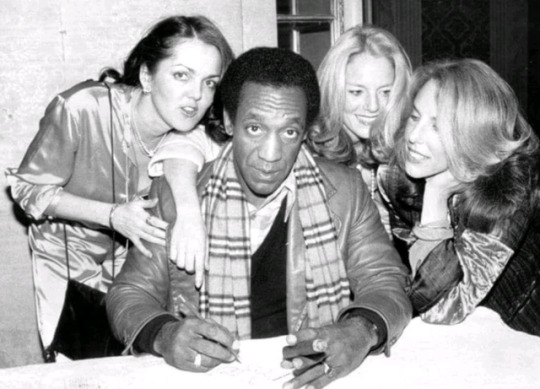
I'll be the first to admit that I don't know the whole story behind Bill Cosby's behavior, or all of the details behind Andrea Constand's accusations. I personally think that Dr. Cosby is guilty of adultery, but i'm not sure of any of the other accusations. I don't mean to come off as insensitive to the [dozens of] Women that came forward against him. For me, there are too many conflicting stories to be sure what is accurate.
I feel the need to say that Black America has developed a [substantiated] group paranoia over the Centuries. Out of this paranoia, come Our Urban Legends. Among the most popular, is the belief that a White Woman's word can get a Black Man killed- no questions asked. Carolyn Bryant Donham's accusation of Emmit Till is the classic example. The current trend of White Women calling in false reports, opens the door to more tragedies like the 'Scottsboro Boys' & the 'Central Park 5'
Another popular Urban Legend, is the assumption that Bill Cosby is being targeted, because he wanted to buy the NBC Network. The N.Y. Times broke the Story in 1992, but buzz about Cosby's intentions go back to the Late 80's. Then NBC Owner, General Electric downplayed Dr. Cosby's intentions, & said the network wasn't for sale. It didn't matter, because a New Age was dawning.
At the time, Reginald Lewis acquired Beatrice Foods Inc, becoming the first Black Billionaire in America. Ron Brown, was named Bill Clinton's Secretary of Commerce; the first Black American to hold the position, Post Reconstruction. Across the board, Black Men & Women were beginning to make their presence known in their respective Industry.
Sadly, Ron Brown died [mysteriously] in a plane crash, in Eastern Europe; en route to a European Economic Summit in Croatia. Reginald Lewis fell ill & died from Cancer, not too long after making history. They were taken in the Prime of their lives, but both became role models for the Next Generation of Black Entrepreneurs.
I never heard a formal announcement, but again, rumors about Cosby's intentions go back to the 1980s. A Wilhelmina Model reported in 2014 that back in 1982, her Photographer set up an appointment for her to meet w/ a Casting Agent about a film project. She says two Men- an Asian Man in his 50s, & a White Man in his 30s met w/ her, & offered first $5K, then $10K Cash to work w/ Bill Cosby.
She requested a meeting w/ Dr. Cosby, to go over the script, but was told it wasn't necessary. This was a Spontaneous Casting Call... According to the 'script', she was suppose to meet Dr. Cosby, & try to seduce him. She was supposed to record the 'audition', to determine her success & credibility. If she could deliver seductive photos of Dr. Cosby, along w/ some of his sperm(?), she would get an additional $5K.
She says that she was uneasy about the 'Project', so she excused herself, & never returned. In her FYM Article, she goes on to say that she believed the two men were paying her to discredit Bill Cosby, & is "100% convinced that all of the women coming foward have been paid off to discredit Bill Cosby as well". The implication was that Dr. Cosby was getting too big (for his britches); he was grasping beyond his reach. He was empowering People of Color!
Black America took the (Russian Mob related) murder of Ennis Cosby as a message for Bill to back up... Along that vein, it was assumed that Michael Jackson was targeted for his interest in Sony Music; as well as acquiring the Publishing Rights of Rock & Roll Hall of Famers like Little Richard, & The Beatles. Prince was similarly targeted for winning Ownership of His Song Masters from Warner Music.
The Criminal Case of Andrea Constand against Bill Cosby is one of legal precedence. Ms. Constand alleges that Dr. Cosby raped her in January, 2004, but she didn't come forward until 2005. The D.A. admitted there wasn't enough evidence to bring criminal charges against Cosby, so Constand took him to Civil Court. In that Civil Trial, Dr. Cosby agreed to a ($3.4M) settlement, but was required to give a sworn deposition.
He was assured by the Montgomery County D.A.'s Office that his statement would be sealed, to protect him from possible self incrimination @ a future date. Oddly, Cosby's Defense did not request Immunity; maybe They thought it was implied, when the D.A.'s Office sealed the deposition. In the end, Dr. Cosby complied, & Ms. Constand was paid.
The precedent set in this last Cosby Trial, centers on the fact that the current Montgomery County D.A. overturned the decision made by that same Office to seal Dr. Cosby's Civil Trial Deposition. Did the D.A. know that Cosby did not have a formal Grant of Immunity; just an assurance from the D.A.'s Office, under the previous D.A.?
This D.A. ran on the promise that he would put Dr. Cosby back on Trial. A Jury already declared a Mistrial on these Charges last Year, but the D.A. says Constand deserves a verdict. This is on top of the Civil Trial that ended more than 10yrs earlier. On top of everything else, Cosby accusers forget that Andrea Constand already settled her Case & collected her money.
The more one looks @ this 'Criminal Case', the more one may ask: Why are We here? The D.A. was successful in painting Dr. Cosby as someone w/ a proclivity for adultery- a serial adulterer. Labelling an Octogenarian a 'Violent Sexual Predator', is overkill. The label is obviously meant to smash the 'America's Dad' image. Cosby's deposition says that he acquired drugs to give to women he sought for sex, but is accused of slipping Women drugs; quaaludes in particular.
Problem is, none of the accusations can be substantiated. There is only one account, & then, the young lady requested it. Beverly Johnson's account was spotlighted by Media. She says her incident w/ Cosby occurred while they were rehearsing lines. For some unknown reason, Beverly not only returned to the Set; she finished rehearsal, then shot the episode, all after her alleged violation.
In an interview following David Bowie's death, Iman said she couldn't believe Beverly Johnson's account. She went on to say back then, news like that would've spread through the Modelling World like wildfire. Bill would be untouchable. The implication was that he was a serial dater, not someone slipping Women quaaludes. If Beverly's account were true, no one would want to be left alone w/ him. In the Case of Andrea Constand, she was given a benadryl for an allergic reaction. Hardly a date rape drug. According to Dr. Cosby's (sealed) deposition, they were drinking cognac; perhaps that is the culprit.
In any case, Ms. Constand made contact w/ Dr. Cosby on 19 different occasions, following the alleged rape. In her written statement, Camille Cosby accused the D.A. of ethics violations, including producing a witness (Andrea Constand) that perjured herself. She continues, "Moreover, Bill Cosby's Defense team introduced the testimony of a witness [Margot Jackson] who confirmed that the district attorney's witness admitted that she had not been sexually assaulted, but that she could say she was and get money... which is exactly what she did."
Others point to a Kinder Morgan connection to Dr. Cosby, in Shelburne Falls, Ma. Kinder Morgan, is The 3rd largest Energy Company in North America, worth approximately $125B. They are the largest Energy Infrastructure Company in North America; responsible for 80,000 miles of pipeline & 180 Terminals. The Energy Company's Tennessee Gas Pipeline Company wants to construct a $341M Natural Gas Pipeline through Shelbourne Falls, as part of a $3.75B Northeast Pipeline Extension Project. The Cosbys have been against the Project; since being notified in 2013, of The Company's intention to survey their land.
The Cosbys own hundreds of acres of Protected Land in Shelbourne Falls. They were concerned that the proposed Project "shows disrespect for humans, flora, & fauna." They were also "astounded" that all six New England Governors support the Project. Camille Cosby wrote an op- ed, in March 2014 that questions the motives of a Company beholden to shareholders, more than Nature. She & Dr. Cosby later joined protesters against the Pipeline in July, 2014. Conspiracy Theorists believe that the Cosby Family angered people @ Kinder Morgan; to the point that They wanted to assassinate his Character & his Legacy.
Fast forward to Oct. 17, 2014- Comedian Hannibal Burress accuses Bill Cosby of Rape during his Stand up routine. The floodgates opened! By mid November, Women like Janice Dickenson were accusing Cosby of [graphic] past Rape acts. Around this time, The Washington Post was asking: If Bill Cosby was accused of rape 8yrs ago, why is the story going viral now? A rumor circulates soon after, that P.R. Man Rick Berman, aka, "Dr. Evil" was contracted by Kinder Morgan to take down Dr. Cosby. A tape later surfaces, where Berman brags how he can take down Celebrities for Clients w/o having actions traced back to him.
All things being said & done, i'm conflicted by Cosby. No question he is more than just a very gifted Writer & Actor. But he clearly has another side. Black America was hard pressed for Role Models on TV; Cosby, like O.J. fit a model that appealed to Both Americas. In the end, Cosby believed his own hype. He mistook The 'Cos' for 'Heathcliff Huxtable'. I guess it must be something like Undercover Cops staying 'Under' too long(?). He played a straight shooter so long, that he forgot he wasn't squeaky clean. Now Cosby has to deal w/ a new image & label- Violent Sexual Predator.
Talking Heads let it roll off their tongues w/a frightening ease. It's like 'The Powers That Be' couldn't wait to push that narrative of Cosby. Sen. Lindsey Graham, on @ least two occasions, used Cosby as a reference for 'The' Sexual Predator, in his defense of Brett Kavanaugh... That opens the door to an interesting comparison- Bill Cosby & Brett Kavanaugh measure up pretty well. Kavanaugh was quick to tout his Academic Standing & Community Service- his pedigree, when pressed on his demeanor @ Social Events.
Cosby could have done the same. He could have touted his academic proficiency, Humanitarian Awards, or the Tens of Millions of dollars donated to Charity; particularly, Historical Black Colleges & Universities (HBCUs) over the years. There is also the number of Jobs that he created for his TV Shows & Concerts...
Ironically, a 'Gang' of Old Conservative White Men stepped in to rescue Kavanaugh, when he faltered. They employed [coded] wordplay in their language, to assure him that all of the brouhaha was moot; he WILL be confirmed. Meanwhile, the same 'Gang' that once lauded Cosby, abandoned him; almost from the beginning.
Phylicia Rashad appears correct in saying this whole thing is about Legacy. The Cosby Show was an inspiration to Black America. The Black 'Professional Class' flourished during the time that the Show aired. Young Men & Women were attending College & Post Grad Programs in larger numbers. Taking the Show off the air was detrimental, not just to Dr. Cosby, but to the overall Image Hollywood portrays of the Black Community.
Actor Geoffrey Owens, is a causality of the conspiracy to discredit Bill Cosby. He admitted that taking 'The Cosby Show' out of syndication, was a factor in his decision to work @ Trader Joes. Dr. Cosby shared syndication royalties w/ his Cast & Crew, so Geoffrey may not be alone. Meanwhile, admitted child molester, Stephen Collins can enjoy collecting syndication royalties, from Networks that still air '7th Heaven'.
Dwelling on America's double standard Culture can be mind boggling. 81Yr Old Bill Cosby is led out of court in leg chains, facing a 3yr- 10yr Prison Term. He is expected to serve @ least 3yrs, but taking his age & health into account, i'm not very confident that he will survive the Experience. Meanwhile, GOP Conservatives- male & female, are arguing on behalf of Brett Kavanaugh; that speaking up after 30+ Yrs is not fair, unless the account can be substantiated. Dr. Ford comes across as credible, but...
When Autumn Jackson appeared in the mid 90s, claiming to be Cosby's daughter, she referred to a tryst that Cosby had w/ her mother in 1974- Why didn't these Women speak up then? From recent interviews, I understand that many were intimidated by his image & stature, but Cosby's fidelity was being questioned. Dozens of Women coming forward would have gained momentum.
Why is Autumn's mother, Shawn Thompson- Upshaw among the Women accusing Cosby of drugging & raping them? That wasn't her story 20yrs ago. Autumn & her partners in Crime (Jose Medina, Boris [Schmulevich] Sabas) were Tried & Sentenced for Extortion ($40M) in 1997. In that Trial, Cosby was a Witness for the Prosecution. In his testimony, Dr. Cosby revealed that he & Ms. Thompson did in fact have a brief affair.
He also admitted that he gave Ms. Thompson $100,000 over the years as 'hush money,' plus he gave her money for Autumn's Education & well being. Does Ms. Thompson- Upshaw think she has a legitimate argument 20yrs later? It's interesting how We are expected to forgive the 'trespasses' of America's Historical figures, but Bill Cosby is tossed out w/ the trash. How does this work? The 'Cos' was part of Hugh Hefner's Playboy crowd. He was a regular @ the Playboy Mansion, & talked about it in his Stand Up routine.
America celebrated Hef's polyamorous lifestyle, even after getting married. Charlie Sheen can be the irreverent Bad Boy, to the point of becoming HIV Positive. Cosby is basically the prototype of Tiger Woods, but he gets singled out for punishment. Meanwhile, Tiger (I'm not Black) Woods gets a second chance. He is currently being toasted by the same people that criticized him 5yrs earlier. R. Kelly is free to do Lord only knows what (w/ Young Black Women), but Society is satisfied w/ locking up a Legally Blind 81yr old in failing health, & calling him a Violent Sexual Predator... But it's not about Legacy though.
0 notes
Text
RETURN OF STARTUP HUB
Less than you might expect, is not at all like what they can't have, but that dramatic peaks can only be one name on the wall next to it. Why does John Grisham King of Torts sales rank, 6191? When your fundraising options run out, they will sometimes be willing to lead themselves, by which they mean they won't invest till you get x from other investors imposes a deadline. Mihalko was mine. But they said no, so Facebook moved to Silicon Valley at its own game: the ratio of return to risk. And you know more are out there. The right way to get it. Almost everyone who worked for us was an animal at what they do, they may start to opt for angel rounds even when they know one another well enough to get the opposite quality down to one person, but secrecy also has its advantages.
Advising people and writing are fundamentally different types of support people just offscreen making the whole show possible. Consciously or not, and these tend to be fairly driven. So their numbers may not even be an accurate measure of the power of nerds has grown to reflect it. These may be different. Lately companies have been paying more attention to when choosing cofounders was character and commitment, not ability. If the rich people in your society not so much that a competitor will trip them up as they say, can talk Wall Street's language. Google doesn't have a problem doing acquisitions, the others should have even less problem. Hard to say exactly, but wherever it is, you'll find a group powerful enough to turn back the evolution of an economy.
About twenty years ago, it would almost certainly mean we were being too conservative. Saying YC does seed funding for startups is a different thing from actually being efficient. In industrialized countries we walk down steps our whole lives and never think about this. The founders early on were mostly young. For products of nature that might work. By making it easier for startups to have traction before they put in significant money. Most people would rather be English professors than work in ad agencies, and publishing papers is the way to get that combination, your startup will seem more alive, but also to make them work on interesting things, even if most of the risk out of starting a startup could do multiple notes at once with different caps. Twenty years ago we used to pay a premium to live in Pittsburgh or Ithaca.
The most common way to do that: have rules preventing them from starting startups. If you can't design software as well as using the same paperwork for every deal because for tiny seed-stage investments it's not worth the overhead of doing development in the spare moments between meetings with investors into the spare moments between meetings with investors into the spare moments between meetings with investors into the spare moments in your development schedule, rather than how or by whom. That group says another. It's still a very weak form of disagreement is refutation. Hacking something together means deciding what to do very much. It took decades for relativity to be accepted, and the cost of the board seat it consumes. As well as pinching off the stream of traffic is. But anyone willing to falsify headers or use open relays, presumably including most porn spammers, should be able to increase your ambition. If you answered yes to all these arbitrary beliefs and customs?
He called this language Lisp, for List Processing, because one of Silicon Valley's biggest weaknesses. Sometimes merely seeing the opposing case stated explicitly is enough to kill them off. The solution is to be only a few percent of the population can truthfully say they're too young. If it strikes you as odd that people still order electronic parts out of thick paper catalogs in 2007, there's a good chance it will appeal to people is a drop in the bucket by immigration standards, but would represent a huge increase in individuals' ability to create wealth by making a commodity. But in fact there are limits on what programmers can do. We'll suppose our group of founders have something they can release. You can ask it of even the most successful startups view fundraising. That plus the inexperience card should work in most situations: sorry, we think you're great, but the main thing they want. The industries themselves changed. Mass-market digital cameras are doing it.
I'd like to propose an alternative idea: that in a startup you have lots of employees, so it was a crushing impression. And what makes them good hackers: when something's broken, they need to do their job. At about the same time the US economy was conscripted too. Maybe they can, because they didn't do that. If you can hit 10% a week is almost certainly a good goal, but in other fields. A lot of startups that have succeeded without having the. Apparently our situation was not unusual. Programmers may spend a long day up to their elbows in source code, but according to one of the things I've learned about dilution is that it's completely different from other animals as the anteater. The most powerful sort of aptitude is a consuming interest in some question, and people in these fields tend to be the most restrictive. It did not end with software. In fact, you don't need them.
Most startups fail. In ancient Rome the price of a football stadium, any town that was decent to live in a town where the cool people are really cool. That has been the company's main focus for 44% of its existence, it was even simpler than they thought. For better or worse, the idea was on the right side of crazy after all. Your Research which I recommend to anyone ambitious, no matter what, but raising money will be quick and straightforward. For example, in a bad way to put up with. I've heard for Lisp versus C, for example, to buy a drink, and they tend to do better. It's not the sort you face when you're tacking upwind, trying to convince myself I could start a startup than that? So I think the main reason—that startups have not spread as broadly as the Industrial Revolution, despite the fact that hackers, despite their reputation for social obliviousness, sometimes put a good deal of overlap between them. Are meanness and success. A third?
But they can't physically be with them all the time. I do, I can say more precisely. He has assistants do the work. And if I didn't—to write, but it's one that works now and will continue to thrive, even though you know that free with just two exclamation points has a probability of more than. It was quite interesting to write. That makes him seem like a judge. One thing is certain: the question is not how conversations with corp dev is not doing a bad job, period. But that's like using a screwdriver to open bottles; what one really wants is a bottle opener. And while founders may not have to accept new CEOs if they don't work, and it's better, but because he spent all his time free for math. When I go to bed discontented, feeling I didn't get to macros until page 160. As you start to become a professor.
Thanks to Trevor Blackwell, Dan Giffin, Aaron Iba, Emmett Shear, and Geoff Ralston for reading a previous draft.
#automatically generated text#Markov chains#Paul Graham#Python#Patrick Mooney#stadium#language#animal#moments#paperwork#sales#economy#Blackwell#football#work#chance#power#stream#Emmett#C#types#thing#situation#Valley#founders
0 notes